Text
So. Much. Knowledge.

Greetings from Barcelona!
First of all, its now been a full year since I walked across the Bowdoin commencement stage and got my diploma! I have to look at pictures to convince myself that its true because I sometimes I can’t believe that it really happened. I watched the class of 2018 graduate this past weekend and I got so emotional. I am so proud of them and all that they will accomplish moving forward. Sometimes Bowdoin has no mercy on its students and to make it to the other side of graduation is a testament to the resilience of all polar bears. Cheers!
The last few months of my life have been a lot of things, some good and some bad, but the title of this post seems especially fitting. My brain is full, my heart is happy, and my spirit feels at ease (most of the time). I have tried to consolidate some of my many experiences below and hope you enjoy reading my reflections!
The MCAT Verdict:
After the *torture* of studying during every single minute of my free time, I am happy to say that I sat for the exam and submitted it to be scored. At the time, it felt like an impossibly hard decision. When the prompt to submit or void my score appeared, I could not control the resulting tears. The test was really hard and I felt exhausted and defeated, to say the least. It didn’t help that my tears prompted the test administrators to stand silently behind me and that the timer was ticking away. How was I to proceed? I had put so much time and energy into the process that it was painful to imagine not submitting. At the same time, I could not bear selling myself short with poor exam scores. In the end, I chose to submit because despite the mountain of doubt, my gut was to do so. A few weeks ago I got the score report and in a plot twist I still do not fully believe, I did much better than I was expecting! It turns out that I made the right call and that all the early mornings and late nights were well worth it! I am another step closer to achieving a life-long dream!

I think that trust in myself and confidence in my knowledge are among the more abstract lessons that Watson has imparted on me. It’s hard to quantify or qualify this, as it is largely a feeling: It is walking off of a plane in a foreign country where you have zero connections and knowing that you will be okay. It is showing up at an event with “up-there” professionals who have a million degrees and awards and knowing that what you have to say is “worthy.” It is making tough decisions and hard calls and knowing that you will be able to handle the consequences, good or bad. In its most powerful manifestation, it is the willingness to proceed even when the fear of failure is unbearable.
Truth be told, applying to medical school horrifies me. “What if I am not good enough” is the anthem of my anxiety. Fear has never stopped me but my Watson has empowered me by giving me proof that regardless of the outcome, there is always so much to learn when you allow yourself to be vulnerable - The process of learning, above and beyond the knowledge itself, is the important and transformative part. That said, I am setting aside my earth shattering number of doubts and proceeding with the medical school application process. Cheers to the joys and challenges ahead!
South African Adventures
Cape Town is hands down one of the most beautiful places I have ever been to. It was such a privilege to wake up, open my wall-sized windows, and be greeted by Lion’s head. Cape Town made me feel infinitely small by allowing me to marvel at the grandness of nature and the larger world I have been lucky enough to explore. I have included some pictures below but you should definitely know that they do not do the city any justice.
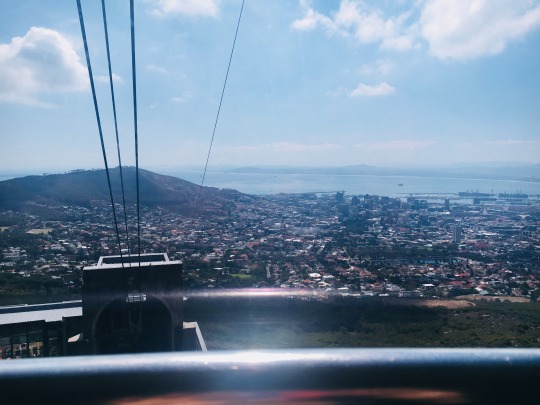


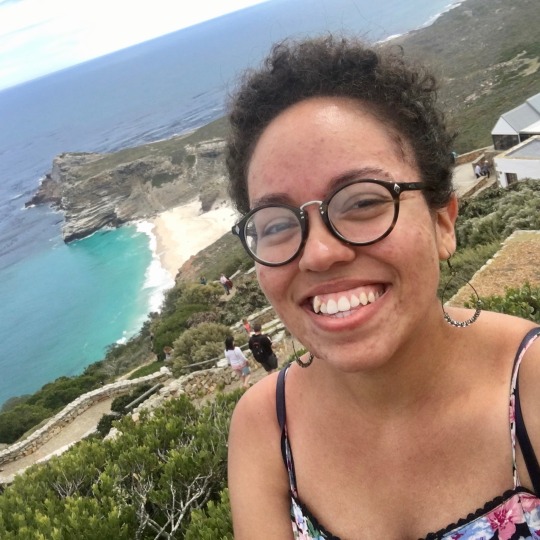
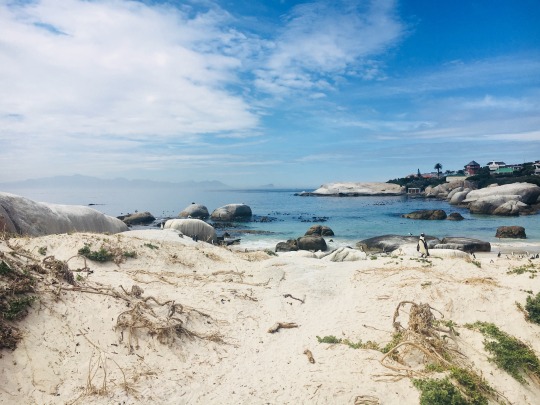

Cape Town was also a really complicated place to be in: water was scarce, the black/brown/white divide was painfully pronounced, and the stark differences between wealth and poverty were clearly written into the fabric of the city. I cannot speak in any meaningful way to the history that created the current socio-political climate of Cape Town and South Africa more broadly. Given that I dedicated a significant amount of time to the final push of MCAT studying and that I was only in the city for a month, my engagement with these themes was very limited. However, conversations with taxi drivers gave me insight into the multinational make-up of the city, the plight of immigrants, and the hope that Cape Town seemed to offer to those from far and near. Random conversations with locals also made clear the pervasive ways in which racism was embedded in the fabric of daily life: Surprisingly, people were not shy to share their thoughts and stories. In fact, I was plunged right into it within an hour of arriving, when my taxi driver took it upon himself to explain residential segregation and the poor living conditions of the government subsidized housing complexes we were driving past.
I could not believe it when, during a stroll through the mall, three white teenage boys got in the way of a black man and started making monkey noises before continuing to the next store. While I am well aware of how common this is in the US, watching this happen right in front of me was both disgusting and on some levels, distressing. As a foreigner on the tail end of my time there, I did not know what to do and felt acutely powerless. It happened so quickly and provided yet another testament to how changes in culture often take much longer than changes in laws. Apartheid ended in the early 90s and yet, dividing lines are far from invisible.
During an excursion with a tourist organization to Cape Point, I remember feeling especially uneasy. My guide was one of the most unapologetically vocal people I have ever met. This was not a “bad” thing and my discomfort was less for what he was saying and more so for how unprepared I was to answer many of his not-so-rhetorical questions about whiteness, Trump’s America, and global histories of colonization. My conversation with him throughout the trip was an example of how my “American-ness” took center stage in Cape Town. This was a bit of a change from Latin America where my Dominican roots were more often the topic of conversation. It’s interesting actually, how people often see these two identities as separate. While I can definitely point to things about me that are “distinctly American” or “distinctly Dominican,” these identities are so interconnected, it is hard for me to separate them in any meaningful way.
The World is a Dance Floor and My Feet Can’t Stop Moving
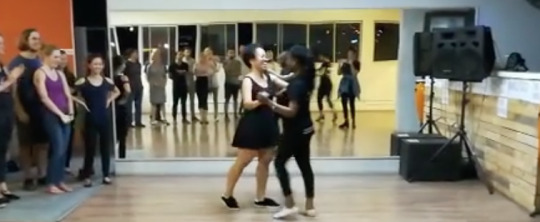
Much like in other project countries, I joined a dance company while in Cape Town. It was really interesting because unlike in other places where the focus was on “extravagant” steps, this school seemed especially dedicated to the precision and beauty of each of the most basic moves. I’ll admit that this approach sometimes annoyed me because it felt so unnatural. When I think of “precision” in dance, I usually think of ballet or lyrical contemporary. For me, bachata and salsa are supposed to be free and improvised and that is where their beauty stems from. Nonetheless, I was still able to appreciate the change in approach. A focus on the exact placement of your foot or the angle of the tilt in your chin during a special turn somehow brings you closer to your body. I think its safe to say that most people don’t spend time thinking about how their arms rest at their sides, or how their neck holds up their head, or how their knees bend when they walk. Getting close to your body, by means of dance, is recognizing and putting on display the beauty of how it all somehow works.
There were a million other things that also made me happy dancing in Cape Town – I loved how the language didn’t matter. People had no idea what the songs were saying but the music still created a space for connection. I loved how our instructors celebrated Afro-Latinidad. Most of all, I loved how strong the community felt and how ready they were to welcome me to the team.
Now, in Barcelona, I am not part of a formal dance group but, I will be teaching my own dance class (!) at an elderly home during the month of June. Pictures and reflections of what that’s like to come. I can’t express how excited I am for this opportunity because sharing the joy of dancing with others as a tool for expression and healing is the greatest of all privileges. It is going to be so much fun!
Barcelona Learning:

Barcelona was not part of my original itinerary and in the chaos of finishing up the MCAT in South Africa, I didn’t really make time to come up with a plan. I had a flight and a place to sleep. I deferred figuring out all the other details until after I arrived in Spain and recovered from the exam. In other words, I landed with no idea what I was going to do.
The magic of having been abroad for over 9 months is that that was not as scary or intimidating as it may have been at the very beginning of my year. I have really learned how to embrace a “less than full” agenda. This has been an important area of growth because as a person who derives a sense of purpose from knowing that I am using all of my time productively, I have always been intimidated by excessively long stretches of free time. There have been *many* days when I have had nothing to do and I would walk out the door and go wherever my feet happened to take me. It is on these spontaneous adventures that I have felt most whole - when I am not on a mission to be somewhere or accomplish something in particular, I can take in the world around me, in its fullness, and just enjoy it. That said, arriving in Spain without a real plan felt like an opportunity rather than an insurmountable source of stress. With the MCAT behind me, I was ready to start again.
Now, nearly two months into my stay in Barcelona, I am happy to report that I have been learning loads about far too many things, if there is even such a thing. I have taken so long to write this post because I could not figure out how to organize all of it into a coherent piece.

Quick! Can you spot me in this picture?
In short, since arriving I have taken my “go everywhere and talk to everyone” approach to its extreme. This is exactly what it sounds like: I show up to everything that is even remotely related to my Watson questions and talk to people like my life depends on it. On the busiest days I am scrambling to opposite ends of the city and shifting from very professional conversations with high-level government officials to more personal conversations with activists. I talk to my sister frequently and when she asks “what are you going to do tomorrow,” I always have to look at my calendar because there is, very literally, no structure to my days here. Rather than diving deep in one place (i.e. a hospital), I have been scratching the surface of many different spaces and discovering how they are connected through reflection. This has been so much fun!
I have attended everything from a scientific conference on advances in genetics, to open community forums, to medical humanities lectures and exhibits about the stories of the immigrant community in Europe. I have also had the privilege of attending a massive festival designed for the elderly community, debates on ethics in neuroscience research and its medical applications in neurology and neurosurgery, multidisciplinary talks on end of life care, and an international panel about reproductive rights and justice in Europe and Latin America, to name a few things.
In general, the things I have been thinking and learning about fall within these very broad themes (below). They are not necessarily “novel” but in their corresponding contexts, have pushed me to think about old ideas in new ways.
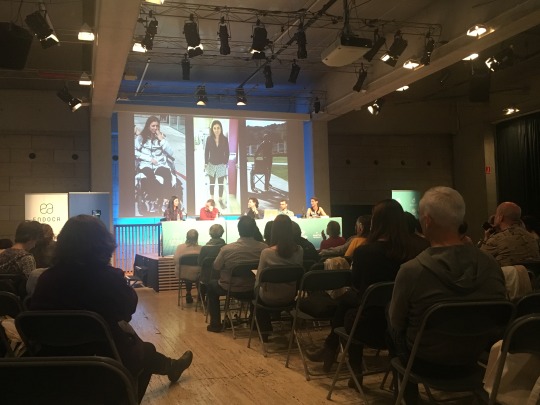
Normalizing Death - Aging, palliative care, end of life ethics, the taboo of death, and hospice are huge areas of interest for me. I genuinely believe that among the biggest issues for our generation to tackle is the question of how to make sure that all of our systems are age-conscious and more concretely, how to ensure that medical institutions are better equipped to guarantee that everyone has the opportunity to live and die with dignity. Perhaps if you are reading this, there is a part of you that cringes at the notion that it is essential to place death in the spotlight when talking about health. That is expected, especially since we are socialized to believe that medicine is fundamentally “anti-death.” This is not necessarily true though. Does a doctor walk away and never look back when a patient is diagnosed with a terminal illness (i.e. no cure is possible)? Of course not! One of the single most powerful statements I have heard this entire year is the following: “Yo ya acepto que no me van a curar, pero me costaría aceptar que no me van a cuidar.” This translates to: “I already accept that they will not cure me, but it would be difficult to accept that they will not take care of me.” To talk about the right to a dignified death is not to lose hope in the power of medicine but rather, to acknowledge that medicine is about taking care of the entire human person, in sickness and in health, in life and in death.
Decline and Dependency - It is difficult to talk about aging for long without getting into topics in neuroscience and their applications in neurology, neurosurgery and psychiatry. Alzheimer’s and Parkinson’s disease are on people’s minds (among other things) surprisingly often. Most notably, dependency that results from cognitive decline is not only a source of anxiety but also, a place where many social, political, cultural, and ethical questions arise. A nurse I talked to claimed the following (paraphrased): “As a society, we place a lot of value on productivity. The value of an individual is often put in the context of their ability to productively contribute to the community of which they are a part. A patient with Alzheimer’s, for example, does not have value within this type of framework and that is problematic because it affects how we prioritize their treatment.” The amount of truth that this claim speaks really unsettles me and I think that it is fair to extend its pretext to the elderly, more broadly. Our world is, very literally, incompatible with old age and there is a great need to work to change that.

Journalism and Healthcare - At first glance, it is extremely odd that these two professional worlds would be even remotely related. However, in our increasingly connected world, where media is a means for both understanding and mobilization, photographic and written representations of health and illness take on really important levels of meaning. I met a photography professor whose work focuses on this and she noted that when strangers photograph illness, they focus on dysfunction whereas when family members take photographs of sick loved ones, they focus on their more “mundane” humanity. Similarly, a journalist at a mental health event spoke about how when mental illness appears in the media, it is usually in reference to terror and violence. If I say “sick,” what kinds of images or words comes to mind? How about “mentally ill” or “dying” or “recovering” or “well?” Whatever those images or words are, it is interesting to consider why those are the things that come to mind. Ultimately, it is these understandings of sickness and health that help to inform how we engage with health systems and what we expect from medical professionals. More importantly, it informs how we engage with each other in the face of illness and what kinds of things we prioritize on the healthcare justice agenda.
Certainly, these three themes are far from inclusive of all the things that have come up. In addition to spending time thinking about geriatric health, I have also spent a lot of time learning about migrant health. Some of the themes in this realm are more related to the tendency to pathologize identity and criminalize humanitarian aid, both of which have negative effects on access to services and outcomes. I have also spent some time exploring health-conscious urbanization, cannabis use in medicine, and the role of big data in the future of our healthcare systems. As the title of this post and some of these reflections suggest, I have been exposed to a great breadth of ideas and experiences. Unlike in other countries, where I found beauty in digging deep, searching wide has enabled me to engage with health spaces in a fundamentally different way: I am hyper-aware of a million caveats and that not only enhances how I think but more importantly, what kinds of questions I ask.
Barcelona Tourist:
I am a big fan of Barcelona. I have never been particularly inspired by architecture but there are so many gems hidden around the city. I could be waiting at a bus stop after a long day and then the sun will perfectly strike a building and for a few moments, I am really blown away. It feels strange that architecture could be so moving but for me, I think it is the idea that at some point, someone imagined a building and then brought it to life. Think about it - every building started in someones mind. It is a truly magnificent thing that we can *literally* build the world around us from ideas. Architectural masterpieces are a reminder of the power of that truth.
Here are a few pictures from around the city.
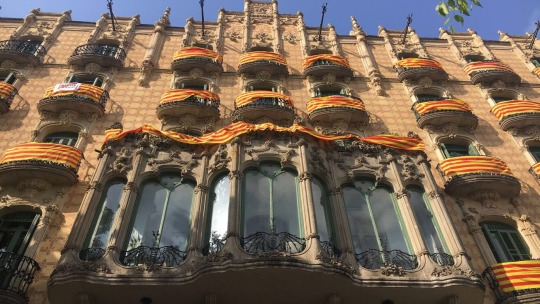
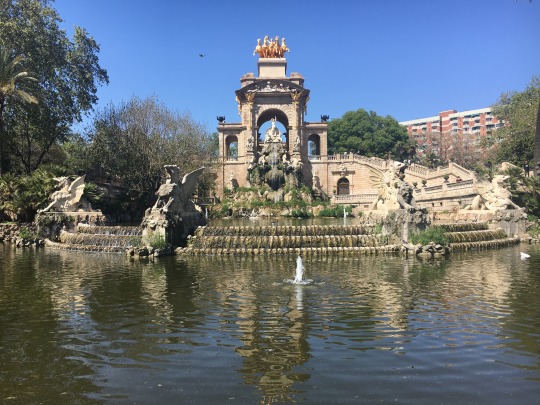

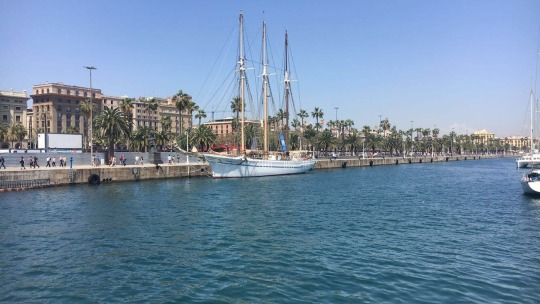

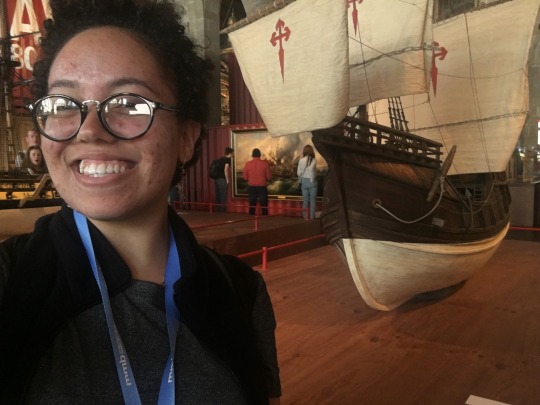

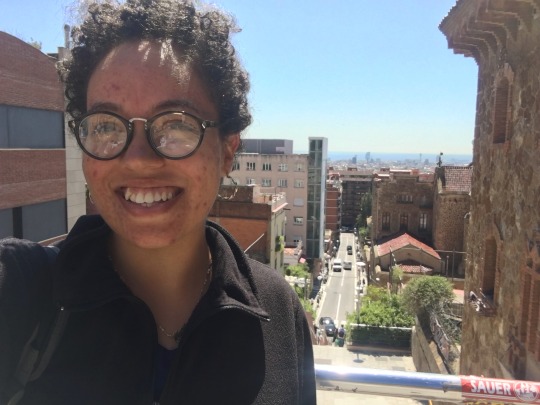
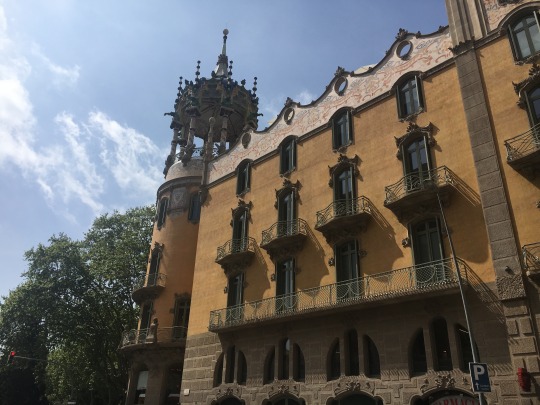
Moving Forward:
Believe it or not, I will be back in the US in less than three months! I am still trying to figure out my employment situation and this is something that causes me a lot of anxiety. In a perfect world, I will move back to New York and do something that builds on the things that I have been doing and learning through this experience. If anyone has any leads, please do share!

In the greatest plot twist of all, I will be ending my Watson in Ireland. If you spoke to me even a month ago, I would not have anticipated this but, the perfect set of circumstances have presented themselves so that Ireland is the logical and ideal next step. I am actually so, so excited. It will certainly be a bit of a contrast to the places I have already explored and while I will only be there for a month, I am putting in the work now to make sure that I can make the most of that very short amount of time.

If you’ve made it this far, thank you for taking the time to share this journey with me. Sitting down to write these posts has created a space where I can try to make sense of what I am living. I can only hope that you too have found bits and pieces that are useful for your own journey.
Cheers!
“ I want to stay as close to the edge as I can without going over. Out on the edge you can see all kinds of things you can’t see from the center.” - Kurt Vonnegut Jr.
1 note
·
View note
Text
New Families, Big Love, and Lots of Learning.

In case you are wondering where I have been for the last two months, the answer, quite simply, is that I have been running around like a crazy lady. Overall, I have been more busy in Argentina than I have been at any other point in my Watson journey so far. Between the hospital, volunteering, dancing, studying for the MCAT in April, applying to jobs for next year, and finding time to explore and build relationships, I am very preoccupied. There are moments when it feels overwhelming but I am very happy with the dynamic schedule I have built for myself. As you know, I am the kind of person who prefers to be running than to be sitting around so I am totally in my element.
Believe it or not, it has been just over six months since I left New York for an adventure that excited me just as much as it scared me. I genuinely cannot believe how much has happened since take off last July. There have been good, bad, ugly, beautiful, difficult, and comforting moments and experiences. I have simultaneously felt like a total stranger and completely at home. I have laughed and have been on the verge of tears. I have taken risks and done things that scared me. I have made new friends and shared parts of myself I don't typically share. I think it is especially appropriate that the half-way mark of my Watson falls just after the new year. It is a perfect time to reflect on what I have done, what has worked, what has failed, and how I can make the most of the second half of this trip.
It also seems appropriate that the second half of my Watson journey will unfold on the other side of the world - In a few days I will be arriving in Cape Town, South Africa so I am feeling all sorts of things, in part because of the water crisis on that end and in part because of what it means to be leaving Latin America.
As you may have expected (given that it has been a while since I last wrote), this post is particularly long. I hope you enjoy my musings!
Palliative Care and Hospice: An Exercise in Listening

The opportunity to be a hospice volunteer has been, by far, the most fulfilling of my activities in Buenos Aires. My job as a volunteer is simple on the surface: I help prepare the mid-afternoon snack and then spend time with the patients who live in the house. Spending time with them can take on a variety of forms, from listening to old stories, to coloring mandalas in the silence of reflection, to wiping a cool cloth on the forehead of a patient who is immobile. I think I am so in love with the position because it is so deeply human and humbling. Before starting, I was worried that it would be sad to work with people who are dying but it is quite the opposite. Recognizing that the patients are living their last days means that our energy goes into making those days beautiful and meaningful in the ways that the patients want them to be. “In the ways the patients wants them to be” is crucial here, as I have learned that people have very different (and ever-evolving) relationships with death and their wishes are not always what you might expect.
When I set out on my Watson, I wanted to learn how to listen to silence. In literal terms, I wanted to learn what kinds of questions, complaints, and anxieties are “written between the lines” of patient’s stories. In more metaphorical terms, I wanted to learn how to recognize what truths silence speaks. Why? At the most superficial level, silence around important issues during a consultation can have detrimental impacts on health outcomes. For example - a question about how to take a medication that gets left unasked can lead to avoidable complications down the line. Beyond the surface however, silence hints at more fundamental trends. Silence is political - in a given system, who has a voice and who doesn’t. Silence is cultural - what is openly talked about; what topics are taboo and therefore avoided? In theory, learning how to listen to silence should enable one to recognize not just what gets left unsaid, but also, why. At the same time, it should allow one to anticipate what important things may get left unsaid so that you can address them appropriately. As someone who cares deeply about the relationship between marginalized communities and healthcare institutions, exploring silence is especially relevant because it also means that I am able to focus on the voice/opinions/experiences of those who get systematically shut out of conversations about healthcare.
That said, working in hospice has been the ultimate exercise in learning how to listen to silence, in ways that I didn’t necessarily expect. There have been patients who could only mumble a word or two. Trying to figure out what they need is therefore a lot harder. I remember one day, checking in on a patient and noticing the red in her cheeks. When I asked her if she was hot, her eyes opened wide. As I proceeded to wipe a cool cloth on her forehead, she closed them with such satisfaction that the moment has remained with me as a very powerful one. The gesture itself was simple but it was a consciousness about what she is experiencing as a patient that enabled me to recognize what she needed. This moment, and others like it, have taught me that listening to silence requires that you put yourself in another’s shoes. It is not just about considering what they are going through from a distance but actually imagining yourself in their position and all that that may entail. What might be going through my mind if I was bed-ridden and immobile? What may I feel if a disease made me totally dependent on someone else or my family stopped visiting me? What would I be afraid to ask about or ask for if I was suddenly in a place with things that are not mine? What would I need if I knew I was dying? In hospice, building a consciousness for potential patient needs is a powerful tool because it allows you to know what to ask about and look out for. Notably, this “consciousness building” is an active process and every patient, volunteer, and nurse I interact with adds new bits and pieces.
Happiness is a Perspective and Medicine is a Celebration

I have grown close to one of the patients in hospice. He is incredibly funny, humble, and honest. Conversations with him are dynamic and somehow, he never fails to remind me of how special and important the small details of our days and lives are. When I arrive he tells me what he had for dinner the night before and for lunch that day. He gets so excited about delicious food and his grand gestures always make me laugh. He has a habit of closing his eyes, swinging his head back, and licking his lips as he considers the dishes he tells me about.
Sometimes I wonder how he feels being limited to the premise but he seems to find an adventure in all the workings of the house. He marvels at the birds that roam the garden and insists on sharing his bread. He spends all of his time in one of the common rooms and knows all of the gossip. You will always find him drinking mate (a traditional drink in Argentina) and flipping through the TV channels. It breaks my heart a little when he talks about not being able to walk or use his hands the way he would like. He gets frustrated when he can’t remember things and although he tries to conceal it, it is obvious. Ruben reminds me that at some point, our bodies betray us and I can only imagine how painful a fact that is to confront and accept.
The day the picture above was taken, Ruben was baptized. While I am not religious, I found the entire thing unbelievably beautiful and Ruben’s joy, inspiring. Ruben’s story, and more broadly, my time in the house, are a constant reminder that embedded in the world of medicine is a celebration of life, love, and human connection. Ruben is one of the people I will miss most because he has taught me so much about life, love, and hope. It saddens me to think that the world will lose such a beautiful soul but I am grateful to have had the honor to meet him.
Looking Death in the Face

My last day at hospice was everything I did not expect. When I arrived, I was asked to sit with a patient and I didn’t think much about it. However, when I walked into the room, the volunteer I was stepping in for told me he was not well and I knew right away that the patient, Jorge, was dying. The look on her face made it clear that it was only a matter of time and as I walked to Jorge’s bedside, I was overcome by the realization that he was likely going to pass while I was there.
I took Jorge’s hand and held it. He was sedated and his breathing very clearly labored: it was as if he was gasping. His jaw moved in a rhythmic pattern at first but the time between his breaths kept increasing. At first I was really scared. I knew what was going to happen but at the same time I didn’t: would the energy of the room change when he departed? Would he take one last dramatic gasp of air? How would I feel? How could I make sense of the fact that the day before we laughed together and that now, I held his hand during his very last moments of life.
No one ever teaches you how to console someone who is actively dying. I wondered if Jorge was scared, what he might be thinking, if anything at all. Was he trying to hold on? When I realized that perhaps this is one of the hardest things anyone has to do, I squeezed his hand tighter and told him that it was okay to let go and eventually, he did. The nurse came and when she noted no pulse, she asked me for the time. I declared a time of death - 15:36.
This was by no means the first time I was close to death. However, it was the first time I was there as it happened. I feel deeply honored and humbled by the opportunity to have accompanied and consoled someone during this transition. I am also happy to know that Jorge was in a place filled with so much love in the weeks leading up to that last moment. At the same time, I am sad because Jorge is gone and making sense of that is hard. The weight of watching life slip away and the emotional challenge of having to confront distressed family members made me think about my own pursuit of medicine. Surely, a doctor has the hardest job because many of their decisions can have life-or-death implications. This doesn’t make me any less excited about becoming a physician but it definitely adds another layer to my awareness of the challenges inherent to the job.
I don’t know if there is a heaven but I hope that wherever Jorge is, he is at peace.
Life in Pediatrics

My entire life, I have been surrounded by children. It’s funny actually, how I exist between two extremes: I spend a lot of time with people who are significantly older than me (I’m usually the youngest in the room) and yet, children seem to follow me everywhere I go. In a surprising departure from what I may have said just 2 or 3 years ago, I think I like the idea of geriatrics a lot more than I do pediatrics. Maybe I am biased right now because of the amount of time I have spent in hospice but I don't know: when you think about the direction medicine is headed - with chronic disease and an aging population becoming more pronounced and incredibly important to address - I think there is a lot of opportunity in the world of geriatrics that I am excited about. Speculation about my ultimate specialty aside, being engrossed in the world of pediatrics has brought into perspective some interesting themes:
The lack of accessibility to medications is one thing; The lack of accessibility to medical machines and technology as an outpatient is another. It is a huge problem because patients who are otherwise ready to go home are unable to do so because they cannot get the machines they need. This is not just a problem for the patient but also, a massive economic drain on the system. It is often the case that paying for a medical machine a patient needs is much cheaper than keeping the patient hospitalized. However, policy and evidence do not always coincide...
The way in which health insurance and employment are related/connected complicates disease management. There have been patients who come in after being MIA for long stretches of time. When asked why, a surprising number of parents explained that they lost their jobs and consequentially, their healthcare coverage. This seems cruel to me, as these are kids whose lives depend on consistent follow-up and follow-through.
The fact that having “bad insurance” is at times worse than having no insurance at all. This has really struck me!
The ways in which doctors have to constantly re-evaluate their role navigating the social vs. medical worlds. There are no clear boundaries and as such, it is a source of personal dilemma as well as a topic of disagreement between doctors. At one point, one doctor commented that the other doctors need to stop being “grandparents” and act like “physicians.” This comment generated a lot of mixed reactions, as the case he was referring to was a very socially delicate/complex one in which many doctors were heavily invested.
Patients often have more than one chronic condition and as a result, are seeing a range of specialists. Lack of communication between specialists, conflicting advice from doctors, and different approaches to care, among other things, sometimes leads to unnecessary delays in care, preventable complications, and high levels of frustration among doctors and patients alike. This is a HUGE issue.
Parents of pediatric patients have to assume pseudo-physician roles for their children. One of the most common examples of this is when they have to learn how to change a cannula on a patient with a tracheostomy. Every parent is different and the transition into this “pseudo-physician” role sheds light on how chronic disease management requires a lifestyle change that is socially, emotionally, medically, and economically complex.
Teens, the Internet, and Terminal Illness:
There was one teenager who was in the later stages of a cystic fibrosis prognosis. He was very aware of the way that his disease affected his mother, as she was very obviously distressed by the situation. The patient, despite being so young, was ready and willing to take charge of the situation. In a lot of ways, he reminded me of myself when I was diagnosed with cancer: he put up a brave front and seemed unafraid in the face of a worsening terminal condition.
One thing that came up when I was talking to the doctors about the case was the role of the internet in conversations about terminal illness. Rather than turning to a parent or friend, teens can ask google about their diseases and internalize what they find without ever talking to someone about it. Processing what they find in these searches is presumably difficult for the patient and importantly, can become unhealthy if left unaddressed. The boy’s mother was talking to a psychiatrist but the patient did not want to talk to anyone.
The notion that parents can’t “protect” their children by strategically explaining chronic and progressive diseases is an interesting idea that came up. I put “protect” in quotation because what pediatric patients should and shouldn't be told seems complex to me. Children are incredibly smart and deserve to know what is happening if they want to know but of course, it is a complicated topic in which several parties are involved.
We all know that google often diagnoses a simple headache as a “brain tumor” and most of us learn to take findings with a grain of salt. However, I can imagine a million different reasons why a young teen who has a diagnosis as serious as CF might not be as critical of what he finds and may therefore become distressed. I have thought about how patients use technology to access health information but I have never really thought about young patients specifically. That said, this was a super interesting conversation that made me think about something I always think about, but from a different critical angle.
On Wednesdays We Sort:
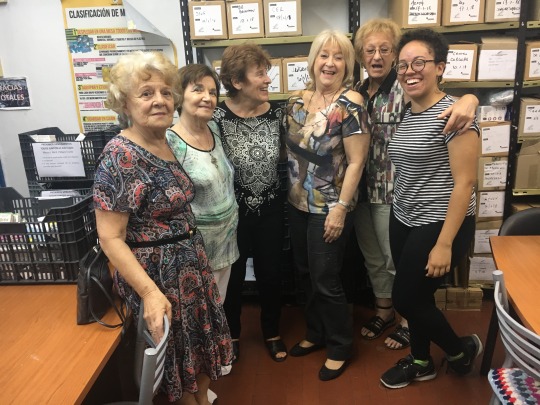
I have been working at Tzedaká where I help to sort the thousands of donated medications that are then redistributed to patients who can’t afford the medication on their own. To me, this is an incredibly important job because one of the most surprising themes I have come across in every project country is the lack of access to life saving medications.
Above and beyond the things I have learned through this work, it is deeply satisfying to know that I contributed (albeit in a small way) to part of the solution to a problem that is undeniably massive. Cheers to making medications more accessible for those who need it most!
Salsa in 10,000 Degrees
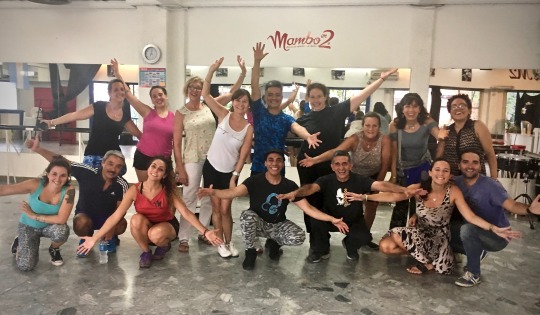
In a few days, I will be leaving Argentina and heading to South Africa. I have spent over half of my Watson year in Latin America (LA) for a lot of reasons. As I get ready to head out, I can’t help but acknowledge the deep and inexplicable connection I feel to this part of the world and the people that call it home. Dancing has allowed me to feel connected to my ethnic roots while being in Latin America has more broadly allowed me to explore “latinidad” beyond my personal identity. To be clear, each Latin American country has its own historical and cultural landscape that makes it impossible to lump LA into a homogenous region. Being able to engage with these intricacies and nuances has deepened my appreciation for the resilience of Latinos, made me more critical of the ways in which the actions of world powers affect people in the most hidden corners, and most importantly, has broadened, deepend, stretched and challenged my understanding of what it means to be a latino in the US and beyond.
I will continue to dance as I proceed with my Watson and I think it will be interesting to see how bachata and salsa are translated, adopted, modified, and interpreted in completely distinct cultural contexts.
T-1 Month Till the MCAT (!!)

Studying is a roller coaster. I love studying bio/biochem sections because they remind me of why the body is so incredible. I even like the chemistry and organic chemistry, which surprises me because I remember how much I hated orgo at Bowdoin. However, physics is killing me slowly.
I had my first (and hopefully last) mini mental breakdown recently. I did a physics problem set and got a super frustrating score and then just started crying. I stepped away to try and get a grip but I was so overcome with the idea that I am in over my head and not smart enough to do this that every time I tried to start again, I could feel the tears well up. I emailed Seth (the health professions advisor at Bowdoin and also one of my favorite people ever) and he told me I am smart and that I am going to be a doctor. At first it made me cry even more because his words felt so far from true but the more I read them, the more truth and comfort I found in them. Honestly, I am so grateful to have people who believe in me even when I don’t believe in myself because it pushes me to keep moving forward. Thankfully, I was able to get past that moment of overwhelming frustration.
I booked a hotel with a jacuzzi and pool around the corner from the testing site in Johannesburg. My plan is to walk directly into the jacuzzi after the test. It will be my gift to myself for doing something that, at the moment, feels like a never ending uphill battle.
Saying Goodbye
Someone I work with recently asked me if it is hard to be so far from home for so long. I told her that I don’t feel like I am far from home because I am always talking to my family. I thought about the question later on and realized that not only do I still feel connected to my family back home but also, I feel intimately connected to the “families” that have welcomed me into their lives and with whom I have grown close in each project country. I am incredibly blessed because I have found so much love and friendship everywhere I have been. Below are just some of the people who I have come to love like family. The hardest part of falling so deeply in love with a new place and with people who have blessed you in a million different ways is having to say goodbye. They each hold a special place in my heart and I will undoubtedly carry the things I learned from them for all the rest of my days.
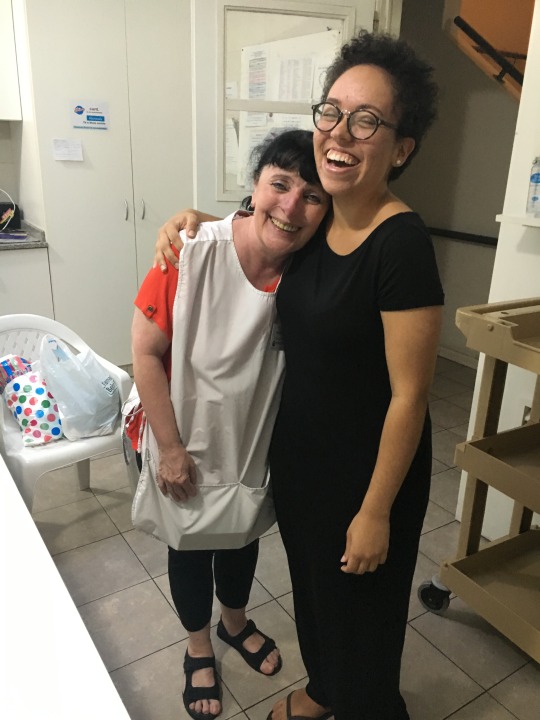




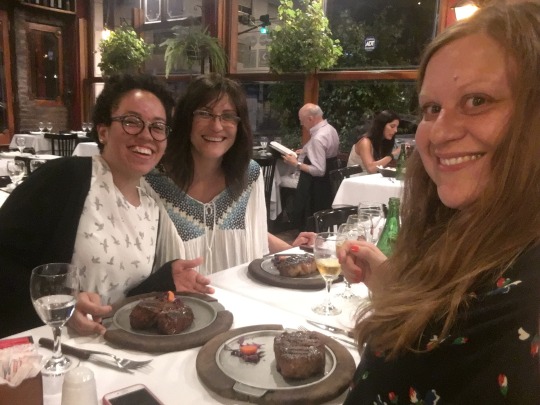


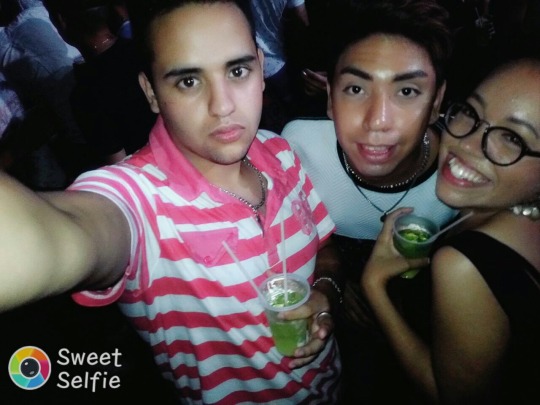

Next Project Countries:
Cape Town, South Africa

I am so, so excited to go to Cape Town. I am going to be a bit more of a “tourist” than usual because there are so many things I want to see and do. I was a mermaid in my past life so being in a coastal city with breath-taking ocean-views and excursions is my heaven on earth. I would’ve stayed longer but the water crisis and the upcoming “day zero” made me anxious about unrest in the city and what was originally supposed to be a 3 month stay is now just over a month. The situation has changed in the last two weeks and day zero predictions have been pushed to June instead of April. However, I will stick to my modified plans, as I think it is the safest move.
Aside from being a tourist, I will devote my time to the MCAT. This is unfortunate in some ways but I think it is the only way I have a chance. I am not scoring as high as I would like and there is a chance that I may not take the test. This is hard for me to admit, as it makes me feel like a failure, but I am really hoping that this month intensive will allow me to push my score just that much higher so that I can get into my dream school! That said, you will probably not hear from me until after the MCAT. In the meantime, send me all the good vibes - I need them!
Barcelona, Spain

I will be heading to Barcelona right after the MCAT and staying for three months. My tickets have been booked and a living situation arranged but I have yet to figure out any details. I am leaving Latin America but still going to be speaking Spanish which makes me really happy. It should be interesting though, because apparently, speaking Spanish is a bit controversial in Barcelona.
In Closing:
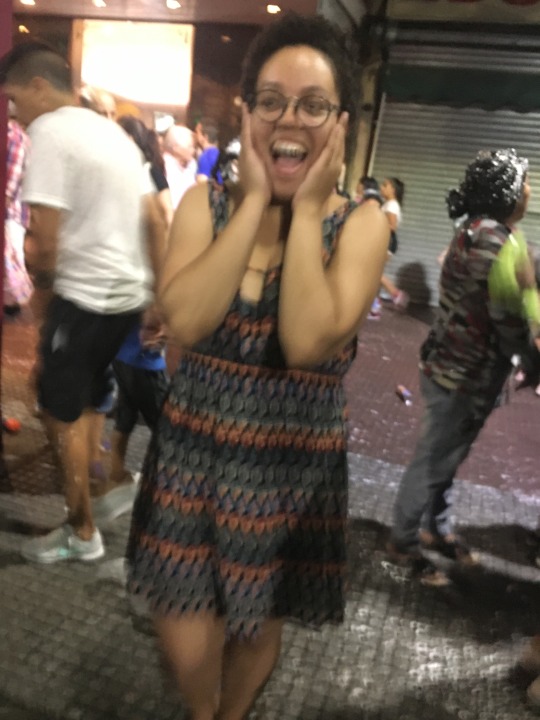
“We travel, not to escape life, but for life to not escape us.” While I did not leave with the specific intention of escaping, I find this quote so relatable because I feel alive in the most profound of ways. I am closing with this picture because my expression captures how I feel about the love, hope, and strength I have found on this journey. How could I be so lucky?
If you made it this far, thank you for your support! I'm sending you a big virtual hug!
1 note
·
View note
Text
December in the Southern Hemisphere
Merry Christmas from Buenos Aires, Argentina! The last month has been absolutely glorious. Details below <3
Getting Here
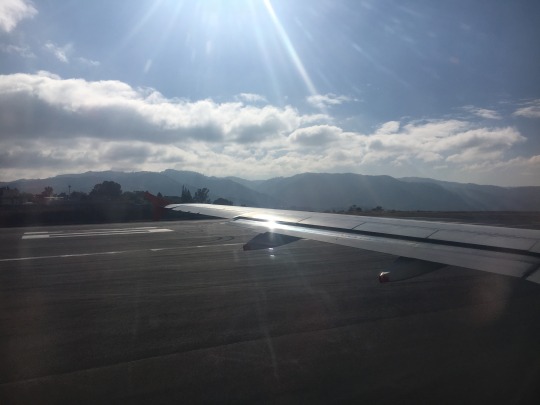
Getting to Buenos Aires was a 24+ hour journey that involved 3 different flights and uncomfortably long long layovers. Walking out of the airport in BA was the best feeling because it meant I was that much closer to my bed.
The flatness of the land around me as we drove down the highway for the first time blew my mind. For all of August - December 1, I was constantly surrounded by mountains and to suddenly step out of that was like “omg.” The flatness was welcome though. I am more accustomed to “flatness.” It feels more like home to me than the mountains.
Getting Settled:
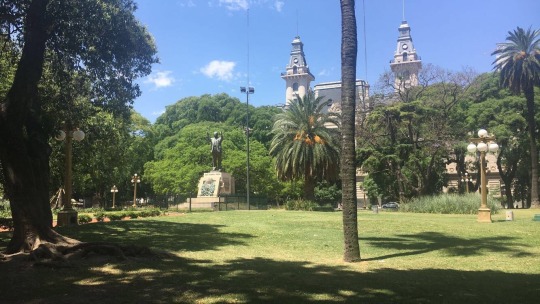
My apartment is amazing. I have written it a million times before but once again, the physical space I call home is very important to me because having a place that I feel comfortable and at peace in at the end of the day is invaluable. I spend most of my time socializing and while I love it, it can also be exhausting. The best feeling is getting home, turning up some music, and cooking dinner all by myself (as weird as it sounds and as strange as it feels to type it.) Small things that add to my happiness: a powerful AC for the 90 degree summer weather, an oven, cable TV, and strong water pressure, all for the first time since leaving the US. These are tiny details that I feel perfectly fine without but I also can’t deny that having them is a benefit that I enjoy.
The neighborhood I am in is also really great. I live beyond the city center in a working class neighborhood where things are more affordable, there aren’t many tourists, and life is a lot more calm (relatively). I am at two major intersections so I have easy access to the rest of the city with many bus options. Everything I may need on a regular basis is within walking distance (i.e. laundry, supermarket, take-out, entertainment, etc).
Much like Quito, Buenos Aires is a massive city with a million and one things happening at all times. The public transportation system is extensive and complicated at first glance but manageable. I am proud to say that I have yet to get lost on a bus. One of the things that has contributed to this is that you have to tell the driver where you are going when you get on the bus so that they can charge you appropriately. This means that it is basically impossible to get on the wrong bus because if they don’t stop where you are going, they will tell you so and let you off. They also have a metrocard equivalent called a “SUBE” card which is rechargeable almost anywhere.
There are a lot of things about Buenos Aires that make me think of New York. For example, the grid-like nature of the city blocks, the large avenues, the public transportation system, and the liveliness of the city after dark. However, one very different detail that I love is the way that green spaces are incorporated into the city. BA has done such a good job at making the city feel so big and refreshing despite it being a major urban center. Incredibly tall trees line avenues, in every community there is at least one green plaza, and there are some huge parks near downtown.
Constructing a Meaningful Schedule:

I have been more busy in BA that I have been in my entire Watson year so far. My schedule is jam packed and when I am not doing something Watson related, I am studying for the MCAT and out there being a tourist. Here are the activities that fill my days:
Hospital De Los Niños:
A lovely doctor I met in Ecuador connected me to a doctor here in Argentina and as a result, I am able to spend time in a major public pediatric hospital 4 mornings a week. I am rotating exclusively in respiratory endoscopy and pulmonology. This is an ideal place because as I have mentioned in previous posts, my Watson question has evolved to concern chronic care management among socially vulnerable patient populations. Respiratory diseases such as cystic fibrosis, are life-long medical battles that often require a lot of hospital intervention, follow-up, and care on the part of parents. Some of the questions that have already come up:
How do people find and pay for 24-hour caregivers for their children?
How do parents manage work when there child is hospitalized for months at a time?
How do parents manage living at the hospital for months at a time?
How do parents make sense of their roles as not only parents, but also as medical experts (and often interventionists) with respect to the conditions their child has?
How do children make sense of their disease and cope with it?
What happens when insurance won’t cover a necessary respiratory device that a child needs before they are able to get discharged?
What are the emotional battles a parent and child must overcome with respect to dealing with a chronic progressive medical condition?
Manos Abiertas:
This is a foundation that I found online that has a lot of social programs throughout Argentina. I reached out to them with the desire to serve in the capacity of a volunteer. They got back to me and requested an interview. For whatever reason, it never occurred to me that this was a serious interview and as a result, I was extremely unprepared and felt disappointed in myself for not representing myself as well as I know I can. I am usually good with interviews, even if they are impromptu. However, I learned that an interview in spanish is VERY different from one in english. I did not have the words I wanted readily available nor the confidence that english usually affords me.
Somehow, they decided to let me move on to the next interview, one which I was EXTENSIVELY prepared for and that I think made up for my first because starting next week, I will be a volunteer at one of the organization’s palliative care homes! I will be helping out in the kitchen on Thursday afternoons and working as an “acompañante” on Friday afternoons. As an acompañante, I will spend time with the residents. For those of you who may not be familiar with the concept, palliative care is when curative treatments are no longer available or an option and therefore, patients are treated with the intention of alleviating pain and helping them enjoy their last days. I am really excited to work with this organization because even though it may sound somber, their work is all about helping people die in peace and with dignity. The patients they serve are coming from the worst of social circumstances and the opportunity to have a warm bed, a hand to hold, and the support of round-the-clock staff allows for a patient to feel loved during what may be one of the most difficult times in their lives.
In a lot of ways, it is an honor to have the opportunity to do this job. I am really looking forward to it!
Tzedeká:
This is another organization that I found through a google search and reached out to because I was interested in what they were doing. I have mentioned before that one of the biggest surprises of my Watson has been the realization that access to medication is such a massive problem everywhere. That said, this organization interested me because their health arm focuses on collecting and redistributing essential medications, at no cost, to those who need it most. They have groups of volunteers who are trained to classify and sort medication at their centers. I am planning on helping in this capacity. I was supposed to start last week but a scheduling conflict made it impossible. I will hopefully get started next week though. Updates on that to come. I am excited for this position because it will allow me, albeit in a small way, to contribute to work that helps close what I will call the “medication gap.” (whether or not that is an actual academic term I do not know)
Dance:
I came to Buenos Aires with the explicit desire to find another dance company where I could meet people, destress, and express myself. I arrived on Saturday and was dancing on Sunday. I “hit the ground running” with respect to this topic. I missed dancing in Guatemala. I had a plan for where I wanted to dance but the travel time ended up being too much and instead, I chose to stick to a company that is a 15 minute bus ride away. Classes run late but the proximity of the studio allows me to take full advantage while still being able to get home quickly and safely. The good news is that it is a great space and the people are genuine and welcoming. The bad news is that the rhythms I love most are offered at times that are very inconvenient for me. As a result, I don’t get to dance as often as I would like. Nonetheless, the sense of community, the chance to let go of some energy, and the joy that comes with dancing has helped ground me here in BA.
MCAT Prep Progress and Medical School Things:

There is not a single day that I don’t ask myself if I still want to be a doctor and each day, I seem to find a new reason why the answer to that is yes. This has really propelled my MCAT studying because as much as I hate physics, for example, I get to live and see what I am working towards each day, and that allows me to proceed with a strong resolve. These last two weeks have been dedicated to figuring out what kind of study structure is realistic and works given my schedule and I think I found one. Additionally, I have found a handful of places where I can get stuff done between commitments. I took a diagnostic test and have a LONG way to go in order to reach my percentile goal and that is somewhat intimidating. However, I just keep trying to remind myself that I make things happen. I want this more than anything so I will work to make it happen: it is who I am and how I operate.
I am very conscious of the Medical School Application process and am getting ready to reach out to potential recommenders and starting to think about what I want to write about in my personal statement. I can’t help but feel like this is the most important personal statement I have ever written and if it actually is, I don’t know. All I know is that the pressure is real! I don’t have a clue what I will write but I am confident I will figure it out.
Notable Moments:
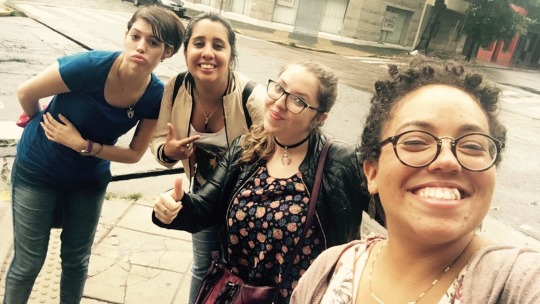
- Going out to a club alone and making new friends who I now talk to daily
- Watching a baby be delivered for the first time in my life (!!!)
- Feeling invincible because I am embracing my sexuality and feel proud of who I am, maybe for the first time.
- Witnessing a coin get taken out of a child’s esophagus and getting to keep the x-ray as a reminder.
- Looking at a chest x-ray and actually understanding what I am looking at and successfully identifying what was wrong.
- The very humbling experience of being present while a mom broke down after her baby had an invasive procedure done.
- Getting new glasses for the first time in like SEVEN years (underestimate for sure).
The Joys of Being a Tourist:
BA is massive with a million places to visit and lots to do. I have not even come close to doing all that I want but knowing that there is so much more helps keep me motivated and curious and feeling good. It is amazing how the city could simultaneously be an architectural wonder, a nature-filled paradise, and a coastal beauty.
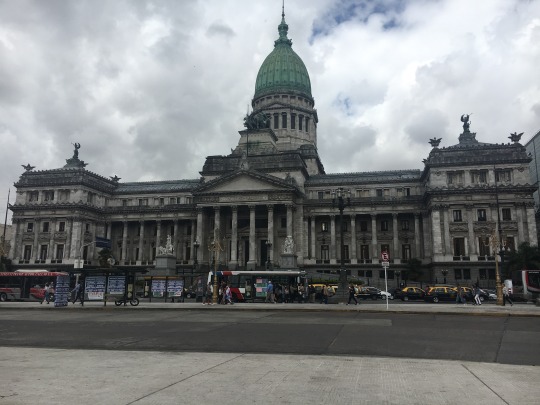

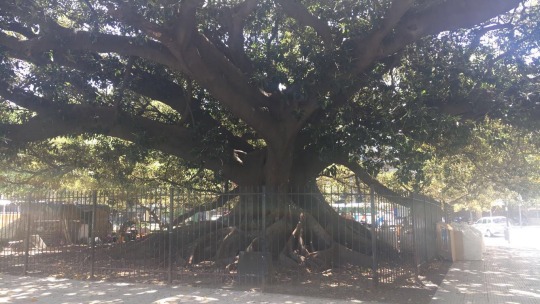
The Challenge and Beauty of Spending the Holidays Far Away:

On December 23rd I found myself scrolling through snapchat and seeing people’s stories about going home really got to me. While it wasn’t the first time I felt a nudge of homesickness, it was the first time since leaving that I really wanted to go home. I didn’t cry but I came close, also for the first time since leaving. I decided to go outside, got a frap, did some quick MCAT review, and then walked around town. The crowds in the neighborhood were abnormal but last minute christmas shopping brings everyone out of their normal evening routine. The sense of liveliness that filled the streets helped lift my spirit and somehow, helped me feel less alone.
On Christmas Eve I woke up feeling a lot better and more committed to finding the beauty in spending the holidays with new friends and new families. I spent the first half of the day bumming around binge watching gossip girl. I spoke to my family later in the afternoon and got to hear about their christmas prep. Listening to my siblings fuss about what the wrapped boxes may or may not have held made me so happy because it was comforting to see how some things just don’t change. I felt energized by our conversation and blasted music as I got ready to head out.
One of the doctors I work with picked me up and we headed out to her friends house, where her family was gathered. I was worried about feeling like an outsider and my presence creating awkwardness. However, to my surprise, I felt welcome and comfortable. I got to play with two beautiful dogs, eat delicious food, teach bachata, and most importantly, laugh a ton.
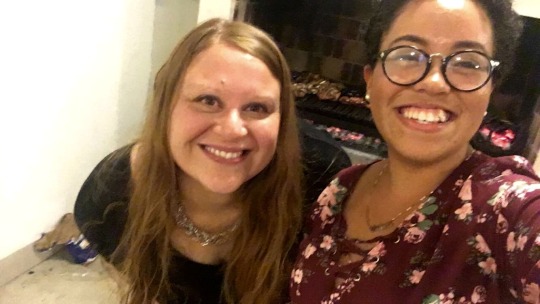
When I got home, I couldn’t help but feel so profoundly grateful for the people that have filled my Watson days with love, joy, and unforgettable memories. It is a true privilege to step so far into the unknown and be constantly reminded of beauty and power of the human spirit that connects each of us.
Things I’m Looking Forward To:
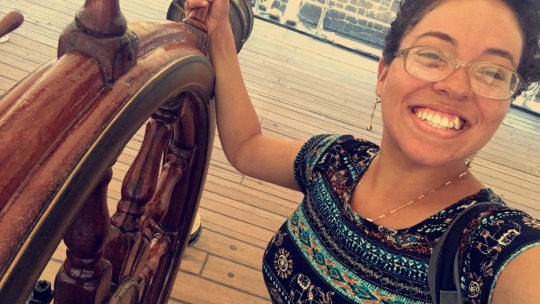
- I am in the final stages of the interview process for a job in San Francisco for next year. I am incredibly excited about the work the organization does, the role I could play, and the broad impact of the position. Cross your fingers that all ends well. I will keep you updated!
- I can’t believe how quickly time is passing but I am definitely excited for all the adventures and experiences that 2018 will bring. Believe it or not, I am close to the halfway mark of my Watson! How that happened? I have no idea.
0 notes
Text
A Million Times Thankful: Guatemala in Retrospect

Guatemala was a lot of things:
Guatemala was beautiful. I am a lover of large bodies of waters and lake Atitlan was absolutely mesmerizing. I tried to take pictures on my iPhone but none of them live up to the overwhelming awe of standing at the edge of the lake and looking out at the volcano lined horizon.
Guatemala was inspiring. I watched a very young girl get on a stage and proclaim to her peers (100+ people) that it was their duty and privilege to defend and uphold the Mayan culture. She was fierce and fearless.Watching her own the stage and witnessing the power of her presence fill the air was a defining part of my experience in Guatemala. This young woman of no more than 12 years old was the embodiment of resistance to oppression and the voice of fundamental community-driven change. I want to be like her one day.
Guatemala was quiet. I had a lot more free time than I am used to and that made for many quiet moments to myself. The stillness of the night and the emptiness of my apartment was hard at times but it also allowed me the space to really reflect on what I have been doing and learning as well as how and where I might use those lessons. It allowed me the time to realize that my dream to become a doctor is closer than I think (i.e. I can take the MCAT this year) and to realize what I need as an individual to function as the best version of myself.
Guatemala was uncomfortable. I didn’t always understand what people around me were saying. I felt isolated in the smallness of the community I was in. I felt restless in the evenings when I wanted to do something outside but there wasn’t anything to do. I felt homesick when my sister turned 21 without me and I celebrated thanksgiving away from home for the first time in my life. I felt disappointed with myself for not doing as much as I knew I could do.
Most importantly, Guatemala was home, albeit for a very short time. Panajachel welcomed me with open arms and invited me to take part in its vibrant community. I am humbled by the generosity, openness, and kindness of those who I had the pleasure of getting to know.
Maybe I’ve said this a million times before and I will probably say it a million times over in the future but I am eternally grateful for the way in which my experience so far has been so deeply human, so profoundly grounding, and absolutely eye-opening. I am excited to keep moving forward, always keeping in mind how I have been transformed by each of the places I have visited and the people I have had the pleasure of meeting.
I came across this quote and felt that it captures my experience in Guatemala:
“The earth has its music for those who will listen” - George Santayana
Cheers to the end of a chapter and the start of a new one <3
0 notes
Text
Small Town Living in Guatemala
The last time I wrote I was just arriving in Guatemala and now I am preparing to head out in a week. A month is no time at all but somehow, just enough. Here are some of the things I have been learning and doing. A final reflection on my time here coming soon!

Women’s Health Group
I got to sit in on a women’s health group meeting at Mayan Families that was super awesome. The group was new and it was their second week. The topics of the day were hygiene and menstruation.
The class is led by a local doctor and watching her answer the questions of the women with such confidence, patience, and empathy made me want to one day be in a similar position. The importance of her role as an educator was clear when she clarified that contraceptives don’t cause cancer and that the hymen can be torn by things other than sex and is therefore not an indicator of ‘virginity.’ The importance of her connection to the cultural realities of Guatemalan women was clear when she reassured a woman that it was not ‘wrong’ to see a local healer before seeing a doctor and that the Mayan culture has to be respected. The value of her being a female doctor was made clear when the women discussed their own reservations about discussing some of the issues that were brought up with male doctors.
The experience made me think of my time with FFLY at Bowdoin because it was the kind of environment in which women gathered and were empowered through learning about their bodies and connected through stories of shared experiences. It’s such a vitally important thing to have these kinds of safe spaces and I only wish that every woman had access to important health information and opportunities to discuss the things that come up in our lives as women.
Lessons from the Clinic

I am sure I have said this before but regardless, I just want to acknowledge what a distinct privilege it is to be able to listen to the stories and concerns that patients bring to the doctors office. Since I am not the doctor, I get to focus more intently on the things that go beyond the physical ailments of the patients. It fascinates me that the challenges patients face here are very similar to those of people I met in Ecuador. Here are some cases that have stood out to me:
- Self advocacy: If a patient doesn’t ask, the doctor doesn’t tell. I have been in various situations when the doctor tells the patient something and I personally don’t understand what it means or how it is relevant. This is problematic because if I don’t understand, there is a chance that the patient doesn’t either. For example, a middle-aged male came to the clinic complaining of unbearable chronic pain. The doctor told him that he was going to give him a prescription for a set of injections that he was to self-administer weekly over the course of 2 months. When the patient mentioned other symptoms, the doctor kept saying that he would give him injections and gave the impression of not really paying attention while he was writing. Beyond the instructions for application, the doctor never clarified what the injections were and how they would alleviate the patient’s very diverse symptoms. I am not suggesting that the doctor should have gone into a detailed biochem lesson but rather, that he give a sentence or two explanation of how this treatment would solve so many seemingly different problems. Why does this matter? As a listener, I didn’t feel very confident in the doctor’s treatment plan because I did not understand how it would help. If the patient felt the same, I can imagine that it might affect his adherence to the plan, especially if it got hard for whatever reason. On top of that, the doctor never asked if the patient was comfortable with self-administering an injection. This might not seem like an important question but when I was working with a diabetes educator in Ecuador, she explained to me that fear of injections was a big problem that affected patient’s ability to follow through. One could ague that if the patient had an issue with the treatment plan, he would’ve said something. However, as I have mentioned in other posts, assumptions can be dangerous. The best doctor should be able to foresee potential problems and address them in that moment to avoid unnecessary complications and delays in treatment.
- Mystery Medications: Patient’s never know what they are taking. It is a massive problem. For example, a diabetes patient came into the clinic for the first time. She said that she had been taking a medication for her diabetes but didn’t know what it was called. It was clearly not working because her sugar was really high that day. The doctor had to make a choice for how to proceed and he chose to give the patient a new regimen of medications despite being unsure of what she was already on. This was risky for a million and one reasons, including the possibility of adverse drug interactions. However, the alternative was sending her home with a very high blood sugar and hoping she would come back at a later date with the medications. There are a million and one reasons why that would have also been a very risky move. This is just one example of a seemingly common trend. There has to be a better way to deal with medications, whether it be keeping track of what a patient is taking, or the lack of essential drugs at affordable prices, or the limited supplies of medicines in large public hospitals that serve vulnerable populations.
- Intimacy, Vulnerability, and Trust: A female patient with a hernia in her lower abdomen came to the clinic. I watched her get examined and it was so painfully clear that she was very uncomfortable with the process. Rather than having a conversation, the doctor also became a bit awkward. I wish he had asked for permission to proceed more explicitly during the physical examination and assured her of her agency in the situation. The doctor was very professional and there was an assumption of trust. However, given her hesitation, I think being more upfront about consent would have gone a long way. As I learned in Ecuador, medical spaces can be traumatic and keeping a patient’s sense of hyper-vulnerability in mind can go a long way for avoiding unnecessary trauma.
Surgery Week at Salud y Paz


A group of surgeons from Canada came to the clinic for a week to perform much needed surgeries at reduced costs to patients. Sunday was “triage day” and my job was to help schedule everyone for their surgeries and make sure they understood all pre-op instructions. It was super busy but so much fun. I left feeling pretty inspired by the things that were about to transpire that week. Part of the surgical team was removing cataracts that had rendered patients blind. Some people were going to be able to see again! What a beautiful thing it is to be a part of that process, even if it is in a very small way.
Becoming a Student Again
A while ago I wrote that I wanted to substantiate the things I was seeing and doing by diving into more academics. I have not been successful in this endeavor until now because I have felt a bit disoriented trying to figure out where to start and how to make sense of it all. I needed some sort of guidance and I think I found it. There is an online platform called EdX and they have free courses from top universities all over the US and the world. I have been shopping around a bit and found a Harvard class called “Improving Global Health: Focusing on Quality and Safety.” I have made it through a good chunk of the material and I feel like it is both relevant to what I am doing and super interesting. The beauty of this class is that it has helped to inform what I pay attention to when I am at the clinic and how I make sense of it.
The Hard Stuff

Panajachel is absolutely, completely, and totally beautiful. The lake is majestic, the volcanoes awe-inspiring, and the people inexplicably welcoming. However, it definitely feels like something is missing for me. Coming from a big city to a small town, I knew that the shift would be hard and that it has been. I wish there was more to do and see. I keep myself entertained and engaged most of the time but I have found that I am not particularly motivated to go out into town and do things. Staying home sometimes makes me feel like I am not taking advantage of this opportunity the way I should be but there is not much beyond the organizations that appeals to me. Spending more time at home means that I have not connected with as many people and that connection is critical for making a place feel like home. Sadly, Panajachel feels like a pitstop rather than a place that I can call my own. Its interesting to me how I am so sure that I will return to Ecuador at some point and just as sure that this is the first and last time that I will be witness to the beauty that is Lake Atilan. I think that this is ok and am not particularly distressed by these feelings. Rather, I have chosen to highlight this as an acknowledgment to my readers that not everything is perfect and a reminder to myself that perhaps I shouldn’t expect to love everywhere I am equally. Obviously, love it or hate it, there are always a million and one things to learn if I turn my attention outwardly and that is exactly what I have done and will continue to do.
Random Adventures in and around Panajachel


I decided to take a walk to the lake without a real agenda in mind. I ended up getting on a somewhat sketchy looking boat that went around the lake and it was absolutely spectacular. I tried to take pictures of the volcanoes and mountains but they all failed to live up to the beauty that surrounded me. I felt so at peace just riding along in the lake. I am a believer that the best adventures are the ones that you don’t necessarily plan for.

Me and Jan taking the ‘chicken bus’ to the clinic in Camanchaj. The public buses here are glorified school buses. Watching them from another car makes it seem like the drivers are ‘nut jobs’ (driving like the world is ending) but riding on the bus doesn’t feel anywhere near as crazy (aka unsafe) as it seems from the outside. Perhaps I have been lucky with drivers who were not on a suicide mission?

These dancers were from Peru. I found their performance to be very meaningful because I was so aware of how these young girls were embodying their traditions and honoring their ancestors through dance. It made me think of my own experience with dance in these last few months. All else aside, these girls had some serious strength and skill!
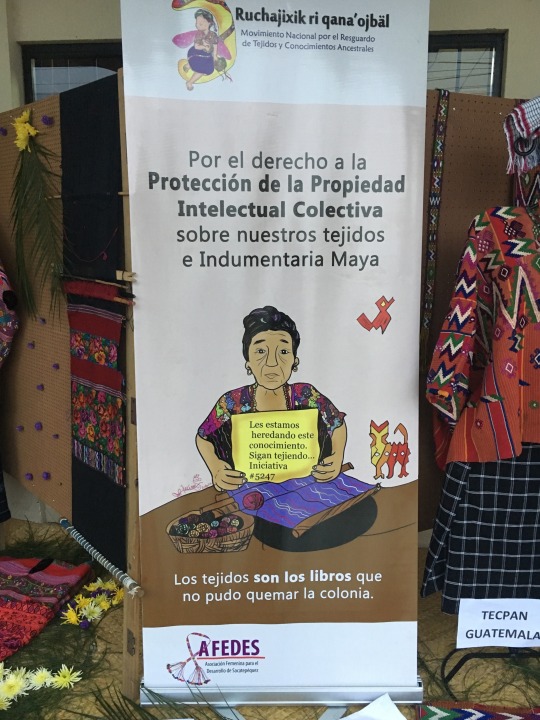
The statement at the bottom of this banner is beyond powerful...

I have no idea what we were discussing but I love the candidness of this picture!
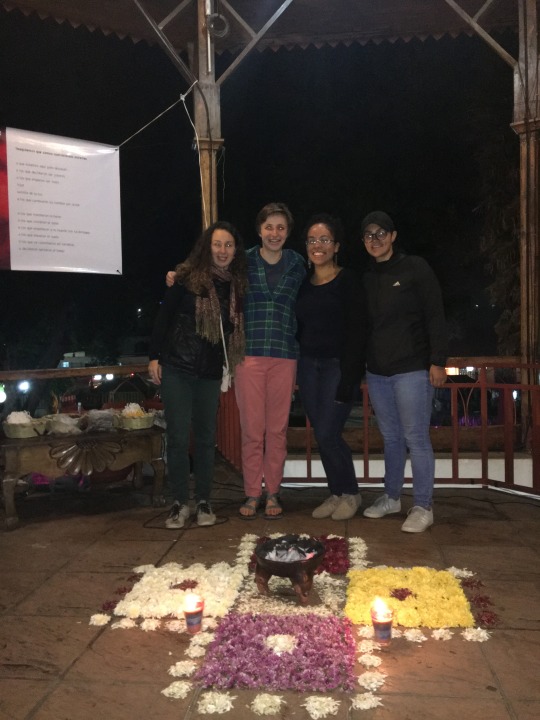

Tried a new drink whose name I do not remember but whose taste is unforgettable. Reminded me a lot of colada morada in Quito.

If you look closely, you will notice that the tree is topped with a rooster. We laughed so hard at this.
Moving Forward

Argentina- To say that I am excited to go to Argentina is an understatement. I am ready for the crazy that comes along with city living. I am not looking forward to the supposed heat and humidity that awaits me but I guess it’s better than the snow I’ve been hearing about in the northeast? Unlike in these last two countries, I am going to Argentina a little “blind” in that I do not have my “work” details completely figured out. I have sent some emails and made some connections but for a handful of organizations, I am planning on just showing up at their doorstep. It’s a bit of a change in strategy but I think it will be good for me because it will push me out of my comfort zone in a new way. One thing that worries me is the fact that it will be both summer and the holiday season when I arrive. This can make it a little harder to find opportunities since its presumably vacation time for a lot of organizations and people. However, I am confident I will figure it out.

Med School - I’m super excited to announce that I will be studying to take the MCAT in April in South Africa and applying to medical school during this upcoming cycle (for 2019 matriculation). This is a huge deal for me because it is a real big and solid step in the direction of achieving a life-long goal: becoming a doctor! Taking the MCAT in April means that I will have to incorporate some intense studying into my Watson adventures. Some people might think that this will detract from my experience but I think that I am in an ideal position because I have a lot of control over my schedule. More than anything though, I think that my experiences help me to better visualize what I am working towards. I am lucky enough to feel inspired by the things I am doing and seeing each day and there is no doubt in my mind that it will serve as motivation when studying gets particularly hard.
0 notes
Text
Travel, Transition, Translation, and More
Greetings from Guatemala! This last week has been equal parts difficult and rewarding. Details below!
Airport Adventures

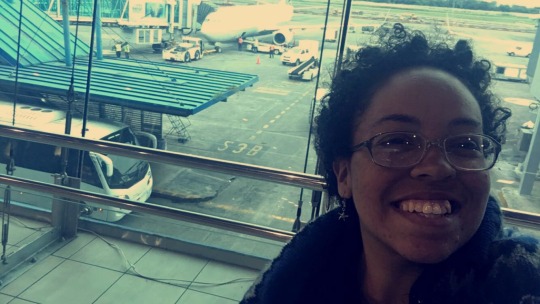
I left my apartment in Quito just after 3am on October 28th. I had made the very smart decision of not sleeping because I figured that it would allow me to sleep on my flights. In retrospect, it was a very bad decision. I didn’t realize that I had left behind my glasses until we were in the vicinity of the airport but thank god for my particularly ugly emergency pair. They have allowed me to see the beauty of Guatemala with full clarity. I don’t know what I would have done if I did not have an emergency pair because I actually have very bad eyesight and depend on my glasses. My hosts from Quito are planning on mailing my glasses to Argentina although part of me wants to invest in a new pair. It’s about time because I have had those glasses since high school. Maybe a christmas present to myself?
My time in the airport and on my two flights was not particularly eventful. However, I got to Guatemala City at about 12:30 only to learn that the taxi I thought I had reserved was not there because the company could not confirm the trip since I have an American phone number. This wouldn’t have been a big problem if I was staying in Guatemala City. However, because I was traveling 3+ hours away (”+” because traffic in the city is worse than it is in NYC). After a moment of panic and several deep breaths, I tried to figure out my options. I could take two buses and risk that I would not make the second one but save a significant amount of money or pay twice as much as I was expecting for a private taxi direct to my destination. In the end, I decided that I would pay for the taxi because I was exhausted and just needed to arrive. Long story short, I wasn’t a big fan of my driver but thank god, I made it safely to my destination at 6:30pm (basically a million hours later). In case you are curious:
Memorable taxi moments- driver assuming I would cover all of his expenses during the trip without asking and in the end not even saying thank you. Almost driving off a cliff (not even joking!) because there was no sign or railing plus it was dark and there was a lingering fog. Almost getting stranded in a random corner of town at night with all my luggage, no phone signal, and zero idea where to go because the only road to my new apartment seemed to be closed.
The Transition

My apartment is really cute, homey, and peaceful. It is away from the main part of town which I like because at the end of a long day, it allows me to retreat to my own space, away from all the noise. It was a similar situation in Quito with regard to the place where my apartment was located. I chose to rent an apartment rather than stay with a host family for the same reasons as before and will likely do so throughout my entire Watson journey.
I won’t lie, I was on the verge of tears on multiple occasions early in the week, trying to make sense of the very drastic and quick transition from Quito to Panajachel. What makes the transition feel so drastic? Here are two of the biggest factors for me:
Big city to small town: Quito felt full of possibility and even after 3 months, it still felt really new, like there were new spaces and places to discover. Like any major city, there were a million and one things going on most of the time that I could take advantage of. In contrast, Panajachel is a very small town. Some locals would likely disagree but that is how it feels to me. I was able to explore all the main streets of town in one afternoon and I am not particularly inspired to do it many times over. I definitely want to visit some restaurants that everyone swears by and buy a few gifts for friends and family abroad but that is it. Lake Aitilan is beautiful and grand. It makes up for all of the things the town does not have. There are different towns that everyone says I should visit but again, I do not feel particularly inspired to do so. I will say that I really want to take a boat ride around the lake. I just love boats and being on the water so that would be a real treat. I am probably going to do that on one of the last weekends here, as my schedule, including weekends, is full of Watson question related activities.
Feeling comfortable and then suddenly very uncomfortable: Arriving in a new place all alone and having to figure out how things work and where you fit in is hard but more than anything, it is uncomfortable. It means taking a lot of deep breaths and doing things that feel very intimidating the first time around. This includes simple things like leaving the house for the first time and navigating town, taking public transportation, meeting new folks at the organizations I have gotten involved with, etc. As i write it I realize how silly it sounds but honestly, if you knew how many laps I took before venturing into town for the first time, you would laugh at me. Of course Quito was like this at the beginning but after a while, I got comfortable navigating the city, I made new friends, and I had managed to piece together a meaningful routine. Now, I am working to do the same thing, from scratch, in a very different kind of environment.
There are other things of course, but they can all be tied back to the above mentioned themes: discomfort and small town living.
I am happy to say that I think the worst of the transition is over. I am meeting people, my schedule is full with activities that feel meaningful, and I am generally a lot more comfortable with where I am at on my Watson journey. That is not to say that it is smooth sailing from here but I am taking it one step at a time and feel good about that.
Translation Galore

One of the organizations I am working with is called Mayan Families. They are based in Panajachel and have a mix of foreign and local staff. I imagined that the organization was relatively small but it is actually massive compared to what I was expecting. What do they do? The tenants of their work are “educate” “feed” “shelter” and “heal” which means that they have several large operations from preschools in neighboring towns to an accessible clinic. I will refer you to their website for more specific details on their organization. I was intrigued by their work mostly because they provide health services to the indigenous community. In planning my trip to Guatemala, I figured it would not only be a good place to get a better understanding of the healthcare system in Guatemala but also, the challenges that indigenous communities face in accessing services.
My time there so far has taken a shape I did not expect but that I am surprisingly happy with. I have been translating a whole host of documents between English and Spanish.
I enjoy translating a lot more than I would have imagined. I think more than anything, I love it because it is giving me the opportunity to increase my vocabulary and reading and writing fluency in Spanish. Improving my Spanish is extremely important to me, as I hope to work with the Latino community as a future medical professional.
The value of the things I am translating also adds to the satisfaction. First I translated the stories of women who had received micro-loans for their businesses. Then I was translating medical records from english to Spanish. Being able to learn more about the lives of the people in this community as well as the kinds of medical issues that they commonly face has been a real treat even though I don’t necessarily get to meet them.
Fun fact: I am considering taking a medical translator course and becoming officially certified.

I got to ride in the back of a pick up truck as we delivered food to schools that work with Mayan Families. If you’re wondering where I am in this picture....we were traversing a massive corn field. I’ve driven past corn fields but I don’t know if I have ever driven through one. I have definitely not walked through one until now.
Proyecto Salud Y Paz + Medical Trip to Cunén

The other organization I am working with is called Project Salud Y Paz and it is based in Camanchaj, a town that is about an hour north of where I am staying. Some of the employees live in Pana and carpool together each morning so it makes getting to the org really easy and convenient. My favorite thing about the organization is that it feels so welcoming and the staff is so kind and open to my presence. This means a lot to me!
On Friday morning I headed out with a doctor, dentist, pharmacist, and human resources professional to a clinic owned by the organization. This clinic opens its doors for two days each month in a tiny town called Cunen. I got to observe consultations with the doctor and listen to patient’s stories.
Here are two exemplary cases that stood out to me:
An elderly man comes into the consultation alone. He is hard of hearing. While it is not certain, he seems a but forgetful and slightly disoriented. It turns out that he has an eye infection as well as an ear infection. The doctor prescribes two types of drops and emphasizes that it is very important he not confuse the two. Normally this would not be a big issue but we learn that the patient can’t read. This will not only affect his ability to distinguish the medicines but also, to read the relevant instructions. The patient told the doctor that he has a son who can read for him but his hesitation did not convince me that he had the support he needed. This patient taught me a few things:
There is an assumption we make when we give patients written instructions that they will be able to read and understand it but when working in communities like this, I don’t believe that should be the working assumption. I don’t even know if it should be the working assumption in the US. I know some illiterate adults. I personally believe it is important to make a habit of asking if a person can read. Perhaps there will be a bit of awkwardness in the moment but even if only 1 in every X number of people say they can’t read, at least you can help that one person achieve better health by crafting an appropriate plan that is accessible to them. The next question is of course, how does a medical professional make sure that a patient can access their instructions after an appointment outside of a written medium? Yes, most people know someone else who can read but a patient who has agency over their health is a lot more likely to follow advice than someone who has to depend on someone else and might be hesitant to ask for help often.
A patient in his 50s came in with an irrationally high blood pressure. When the doctor asked if he was taking the medicine, the patient responded no because he did not feel any pain. It was very clear that the patient did not understand the gravity of his exceptionally high blood pressure, as he was laughing and smiling when talking about stopping his drug regime. This patient brings to the forefront another consideration when seeing patients: Health Literacy
In addition to the general illiteracy I mention above, one also has to recognize that a lack of health literacy can also negatively affect a patient’s ability to follow through on medical advice and therefore contributes to negative outcomes. What exactly is health literacy? I will refer you to this very useful fact sheet for the sake of not writing a novel. In this particular case, the patient did not adequately understand the relationship between their lifestyle choices and their bodily function and as a result, made the very poor decision to stop taking their medication.
Tying these two cases and their corresponding reflections back to the larger picture: There is no doubt that lots of people still need better access to doctors. Importantly, access is not fully achieved when a patient is seen. Access to health information is just as important because it is what allows a patient to maintain their wellbeing between doctor visits. Sometimes it is hard for me to understand that access to health information is such a big problem because most answers are a google search away. However, I have to remind myself that not all people have access to internet. Not all people can read. For a million different reasons and in a million different ways, not all people have a means to get the information they need, when they need it. Even if they do have it, there is no guarantee that they will be able to digest and apply it appropriately.

Taken half way to Cunén, which is almost four hours away from where I am staying. Not pictured: the anxiety of driving on horrible narrow roads up mountains with falling rocks and very loose earth (i.e. risk for mud slides).

After the first day at the clinic, we decided to roam around town only to learn that there was a circus and they had set up a mini arcade of sorts next door. I don’t think I’ve ever had this much fun playing foosball. This is a candid shot after scoring a goal.
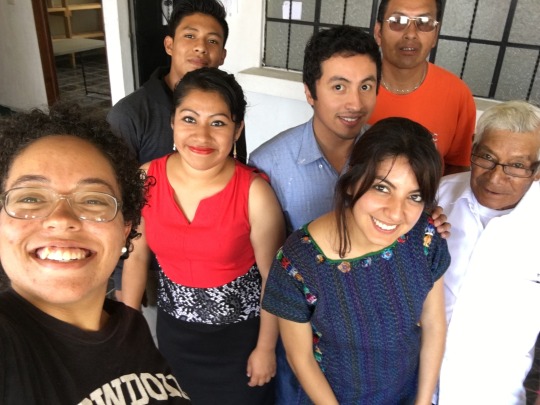
The clinic team after a successful two day trip.
Thoughts on Moving Forward:
Guatemala: I will only be in Guatemala for the month of November so I am working hard to make the most of my time here. Surgery week is coming up at Salud y Paz and a bunch of Canadian doctors will be in town. That should be an interesting time. I don’t know what other projects I will be working on at Mayan Families but I am sure they will be great learning experiences. I will probably stop by another organization or two while here to get some other opinions on the health situation here. Overall, there is a lot to do and things are looking up. When I am busy, I am happy!
Upcoming Holidays - I am not sure why but I am hyper aware of the fact that the holidays are coming. I feel this overwhelming need to fill that time with meaning, especially since I have chosen to be so far from home. I don’t know how I will do so. This whole situation makes me think about the fourth of July in India last summer. At most, the 4th has always been an excuse to gather for a BBQ or some kind of outdoor adventure with family and friends. When I was in India, it felt so different and meant so much more. I don’t know if it was because I missed home or if it was because I was hyper-aware of my American-ness while I was there. Regardless of the reason, I have never felt more American in my life than on the 4th in India, making burgers with a fellow American. I was lucky to have people to share that day with because I think I would have felt really sad otherwise. I hope I can share these upcoming holidays with new friends and find a sense of joy and peace among them.
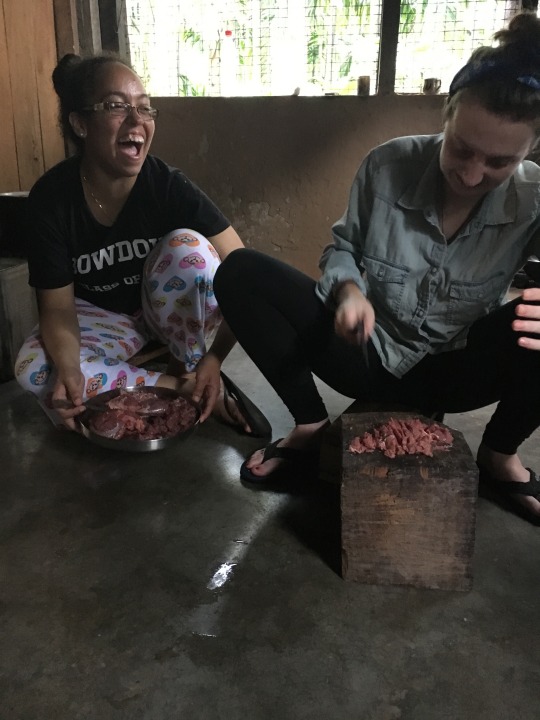
Mincing beef in small town India to make burgers and celebrate the 4th of July circa 2016. This was a good day and very easily the only 4th of July I remember in detail.
Argentina- I have a place to stay once I arrive but I am still in the process of figuring out what I will do to learn more about health in the country. I have a few ideas and a connection, I just have to reach out. I am not dancing now because there are no opportunities to do so in town. That said, I am really looking forward to getting involved at another dance school in the city. I already have one in mind and it seems like a really awesome place. I looked more closely into the details of my flights after receiving a notification that there has been a change in my itinerary. The baggage rules seem to be even stricter than they were to get to Guatemala so I am already panicking 3+ weeks in advance.
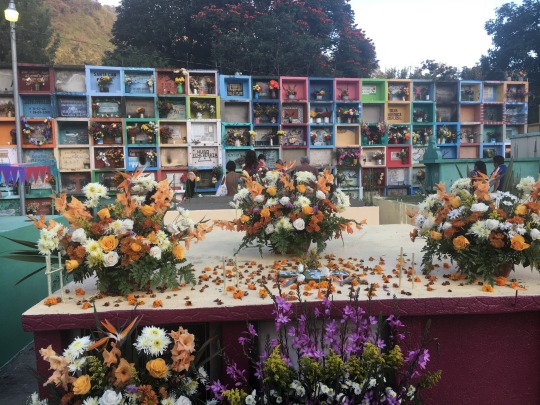
There could not possibly be a better reminder during this time of transition than this. It feels like this quote was written just for me at this moment in my Watson journey:
“Honor the space between no longer and not yet”- Nancy Levin
0 notes
Text
The End of Something Beautiful and Start of Something New.
After what felt like an eternal journey from Quito, I have officially arrived in Guatemala. How quickly three months has passed! I am in eternal debt to all the people who made me feel at home in Ecuador, welcomed my inquires, and reminded me that love and hope always triumph. I’m sad that I had to go because I feel like there is still so much left for me to see and do in Ecuador, so many more moments to share with those I have grown to love, but, I digress. I have every intention of going back one day :) Here is a final reflection and a whole host of pictures <3 Guatemala update to come!
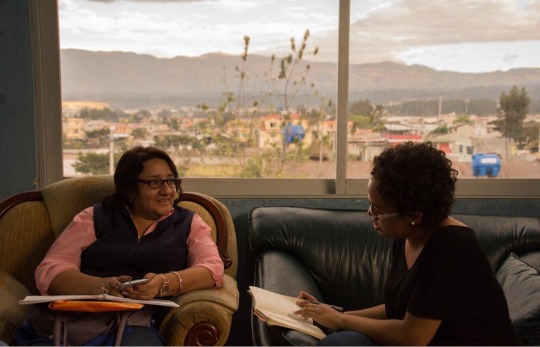
Final Reflections:
How does one make sense of all the things that have happened in the last 90 days? Simply put, adapting to Quito has been an exercise in mindfulness. Trying to capture the details, understand the nuances, and integrate myself meaningfully has required that I observe more intently and appreciate with more profound intensity the reality that surrounds me.
I have found healing in the early morning view of the surrounding volcanoes that make me re-evaluate the grandness of nature; in the afternoon commute, on packed buses that play my favorite Spanish music and leave me energized after a long day; in the pride of wearing a lab coat and being called ‘doctorita.’ I have found comfort in the feeling of home in a foreign place, in the joy of the company of new friends, and in the stillness of my sparsely decorated apartment; I have found inspiration in speaking the language that connects me to my ancestors and in dancing the rhythms that connect me to their lands. I have found hope in the stories of resilience and determination that people have shared with me; in the form of awe when standing on mountaintops and swimming in the ocean. I have found assurance in the knowledge that I can play an important role in the advancement and improvement of our medical systems. My excitement to serve as a future physician who meets patients at their most vulnerable moments has grown with the knowledge that each day I am getting more prepared to advocate for them.
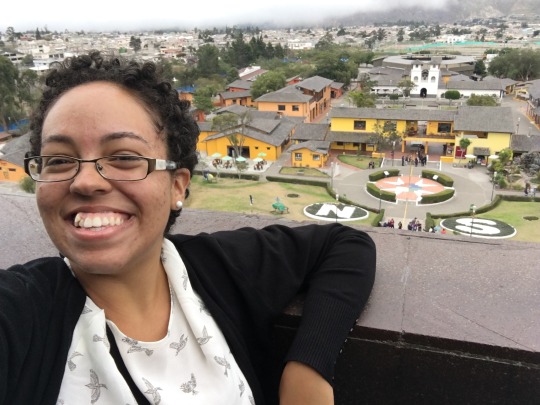
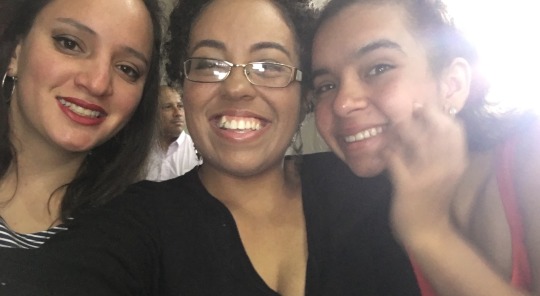
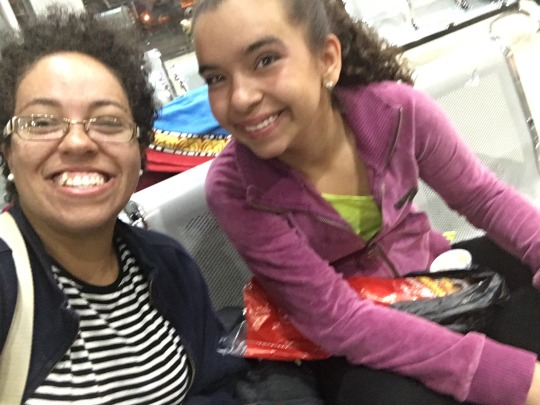





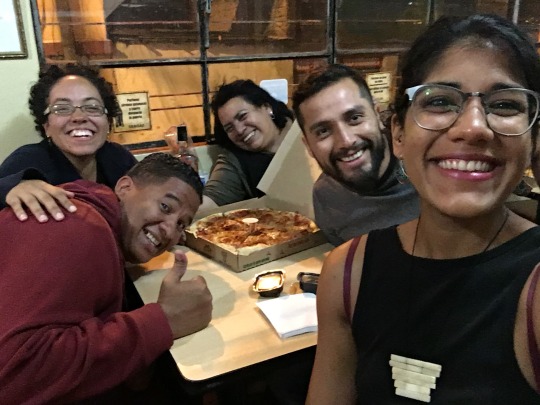

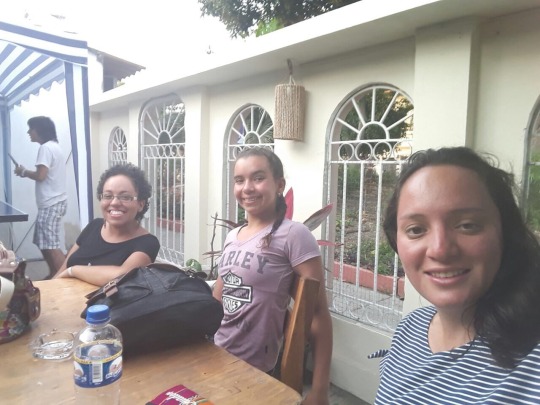

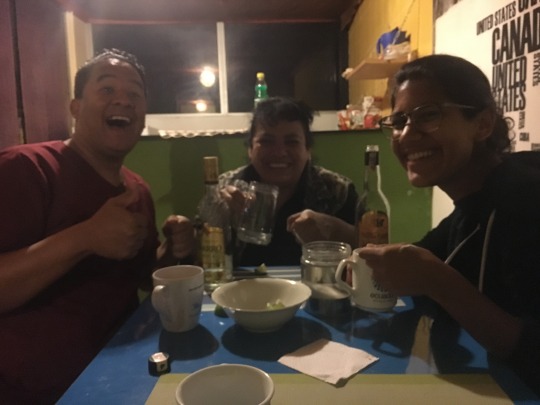
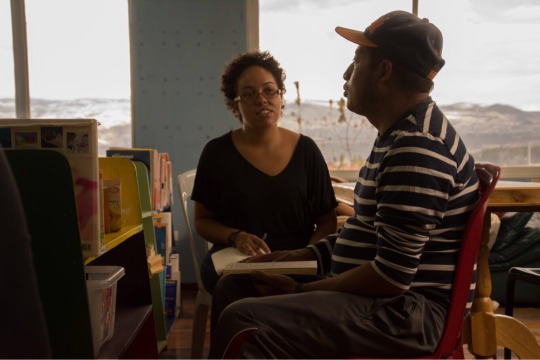


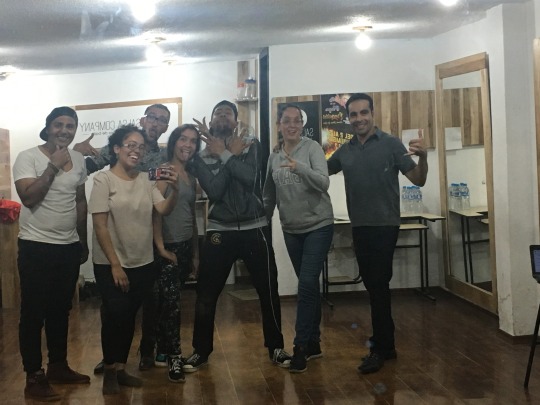
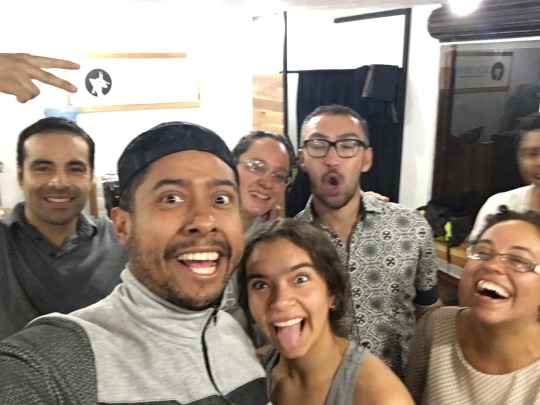


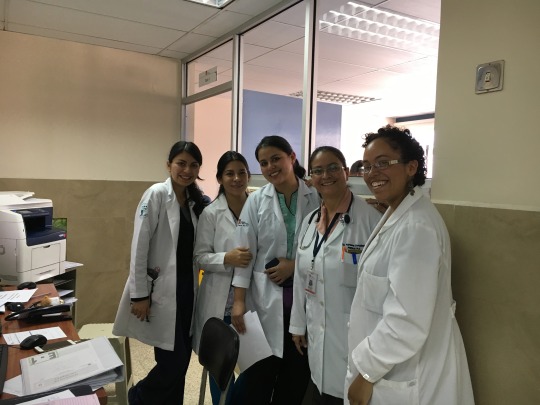

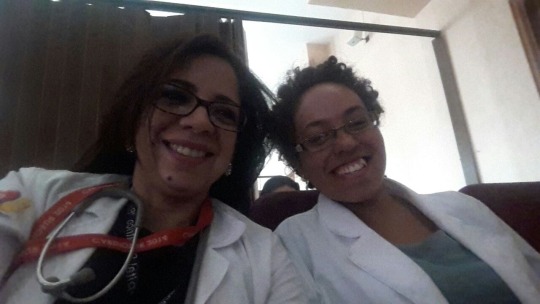

As a closing quote and an immensely relatable truth:
How lucky I am to have something that makes saying goodbye so hard. - Winnie the Pooh
0 notes
Text
T-1 Month Till Departure to Guatemala 0.0
It’s been forever because I am here trying to take in every second of every minute in this beautiful country with all of the people that I have grown to love. I feel good. I am learning loads. Most importantly, I am growing in ways I did not anticipate and it is so maddeningly satisfying. This post doesn’t do my experiences justice but here is my attempt to verbalize what is so often visceral. Enjoy!
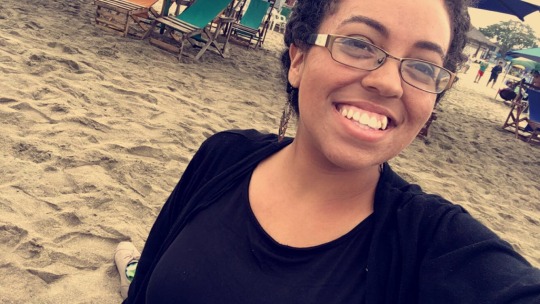
A Real Life Beating Heart in an Open Chest Cavity!
I had the very special opportunity to observe a surgery to fix an arterial septal defect. In short, this is a congenital defect that results in a hole between the left and right atria of the heart. This is problematic because it causes back flow of blood and in the longer term can lead to issues such as high pulmonary pressure. Watching this surgery was a true treat because I got to see, literally a foot away from me, an exposed heart beat and lungs inflate and deflate before the patient was put on bypass. The experience was one in which I was reminded yet again of the marvel that is the human body and the power that is modern medicine.
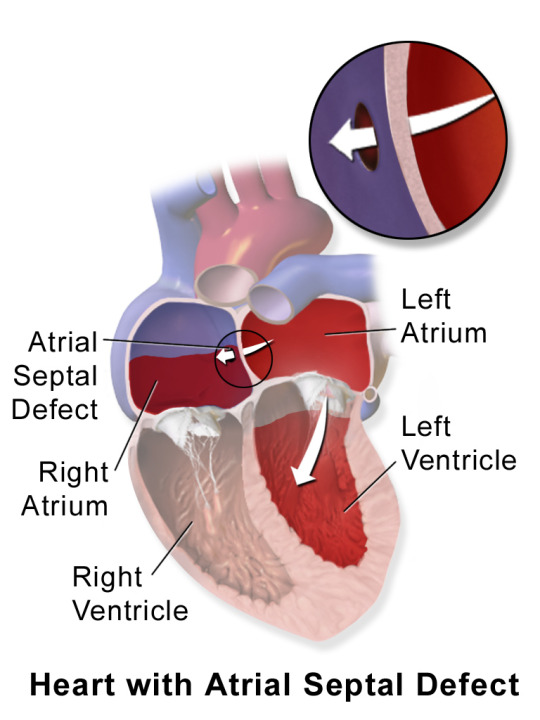
Interviews upon Interviews:
I’m excited to say that I have had the opportunity to interview members of the general community, in more formal ways, in the last few weeks. It has been a great treat and I learn a something different each time. One of the first things I ask is for people to tell me what being ‘healthy’ means to them. The World Health Organization officially defines health as “a state of complete physical, mental and social well-being and not merely the absence of disease or infirmity.” Interestingly, when I ask people to define health, an overwhelming majority refer to physical well-being and more specifically, being in the habit of eating ‘healthy’ foods. To me, these responses suggest that people are hyper aware of how food affects their health but given that obesity is on the rise in Ecuador, awareness does not automatically translate to changes in lifestyle. Responses to other questions reveal why this may be the case, including but not limited to, economic restrictions. Very few mention social and mental well-being in their definitions although the topic of “stress” has often come up.
Another interesting thing that has come out of these interviews is the importance of alternative or natural medicine. Most people seem to refer to it as a first line of defense but when that does not work out, they turn to western medical institutions. There does not seem to be a preference for one or the other but rather, a recognition that both systems have valid solutions that are differently sought after depending on the situation. This is super interesting to me because as an outsider, it is easy to assume that the two systems work in opposition. However, regardless of whether or not they are fundamentally oppositional, people utilize both without much apparent dissonance.
People consistently refer to the same problems in the hospitals: long wait times, lack of medications, negligence, and the absence of humane treatment. Notably, people recognize that while the solutions are obvious, the actual realization of those solutions is quite complicated. Bureaucracy and politics is cited as the biggest barrier by both patients and doctors.
Jornada de Endocrinologia
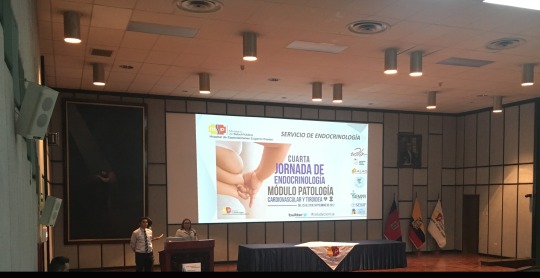
I had the wonderful opportunity of attending an endocrinology conference. Some of the presentations went over my head because they were focused on tools that doctors can and should utilize when they make treatment decisions for patients. However, there were some really awesome physiology-focused conversations and some interesting perspectives on the state and future of health in Ecuador. Here are some things that really stood out:
- A lot of the scientific studies presented during the conference were from North America and Europe. Presenters noted that this is problematic because many of these studies are mono-ethnic and therefore not optimally useful for application in latin america where different risk factors, genetic make-ups, and lifestyles limit the applicability of the studies. This was especially true for studies that produced risk calculators and scales. There was an overall consensus that more Ecuadorians need to publish studies done in Ecuador.
- When asked to choose between longer visit times or investment in better medicines, a doctor adamantly supported the latter. His reasoning reflected an opinion I had not encountered before. According to him: “patients misuse consultation time. When a doctor asks how they have been, they go into detail about things that are apparently irrelevant to their health and which is ultimately a waste of time. As a result there is no need to increase the length of time assigned to each patient but rather to educate patients about what consultations are for.”
- I liked the notion of “life style therapy”
- The quote of the conference was undoubtedly: “el mejor medicamento es la educación.” (education is the best medicine)
- When pathologies cost nations more money, they get more attention, even if they are not necessarily the deadliest.
- I learned that there is such a thing as abdominal obesity.
Sexual Health: HIV/AIDS
I participated in a guided conversation about HIV/AIDS and the thing that struck me the most was the reality that disease can have a negative social impact on the lives of individuals, in addition to the mental and physical impacts. I think that I knew this subconsciously but this conversation bought this thought to the forefront and made us evaluate it thoroughly. ‘Social impact’ can have a lot of meanings but in this particular case, it refers to the relationship between the diseased individual and those around them. Unfortunately, there is a lot of stigma associated with HIV/AIDS and as a result, people that have the disease often face discrimination and isolation. As a result, the topic of confidentiality, access to information, and the question of the responsibility of individuals to inform sexual partners that they have HIV/AIDS came up. There were many interesting opinions!
Here are some of the questions that were initally posed to facilitate conversation that I challenge you to honestly ask yourselves and those around you. Evaluate your answers. Why did you respond as you did?
- What is the first thing that comes to mind when you hear HIV/AIDS?
- How would you react if you learned you had HIV/AIDS?
- What would you do if you found out your neighbor had HIV/AIDS? Your friend?
La Mitad Del Mundo Adventures
They say that there is a ‘real’ and a ‘fake’ middle of the world (a few meters apart). There was so much to do and see that we didn’t make it to the ‘real’ equatorial line. However, I had such a great time that it doesn’t even matter!
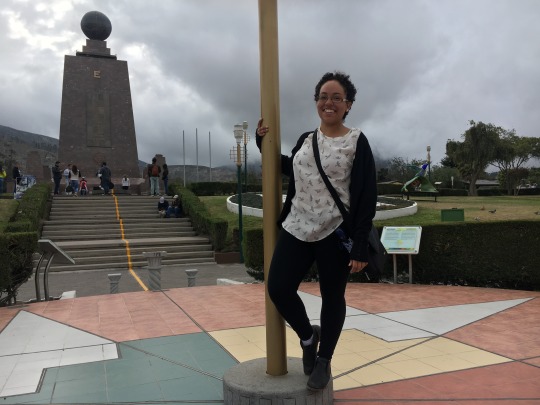
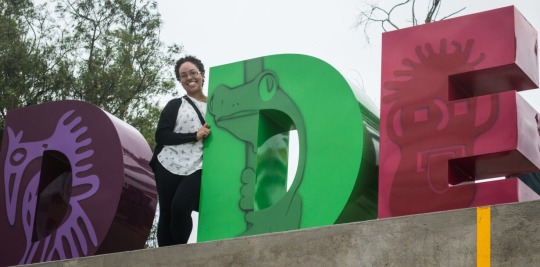
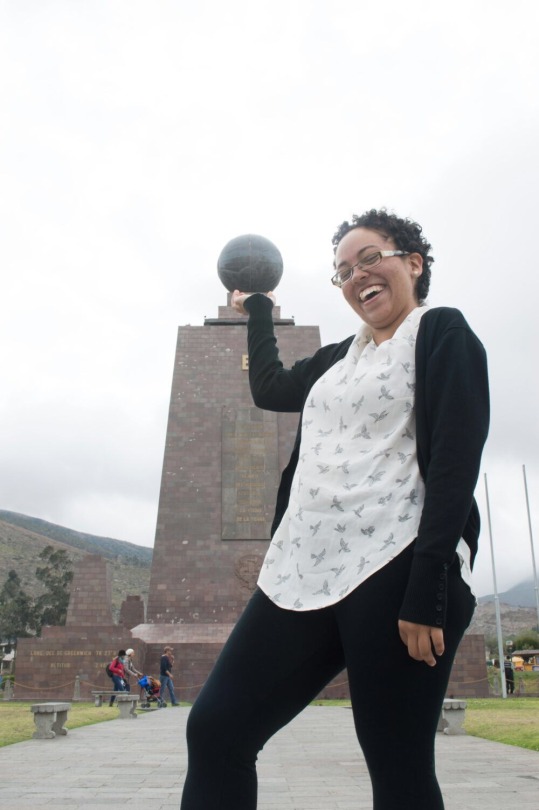

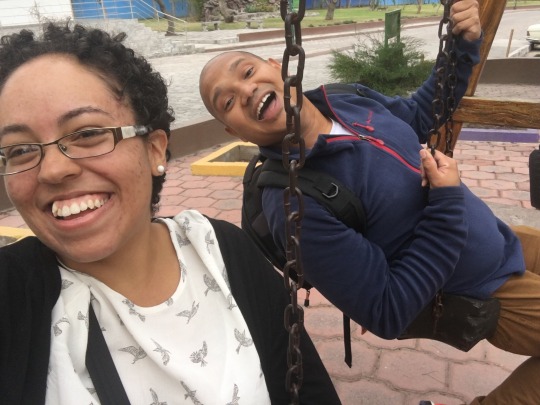
New Friends
My empanada cravings led me to meet a wonderful woman from the States and we connected instantly. Super grateful to have a friend who is my age and who comes from a similar background.

Made a spontaneous decision to go out and get to know each other in the midst of uber-loud music, practically professional dancers, and a few performances that left us awe-inspired.
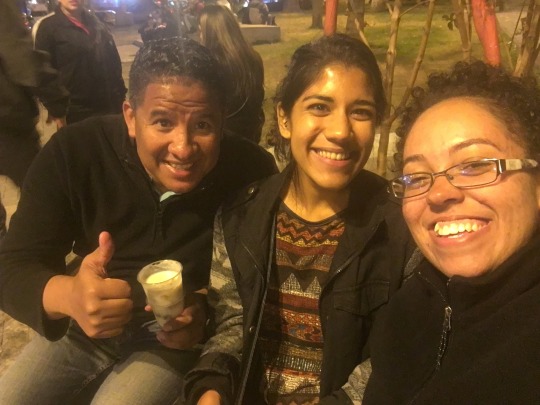
Just before this picture was taken, I had some amazing fish, yuca fries, morocho, and the ever so highly recommended fritada. Can you see the satisfaction in our eyes?
Trip to Guayaquil, Ecuador
I was convinced that I was not going to make it to Guayaquil but the minute I heard that a group from the dance academy were going for a salsa festival, I joined. I see these folks multiple times a week but when you live with a group of people, even if its just for 4 days, you grow so close so quickly and it is a truly beautiful thing. Grateful to these amazing humans for bringing light and joy to my life this past weekend. I had not laughed so much and so hard in a while! Highlights:
- Our instructors placed third in salsa pairs and second in bachata pairs!
- I tasted some awesome typical foods on the beach whose names I will not remember
- I swam in the pacific!
- I rather unsuccessfully danced salsa with real life professionals but was a star with the bachata moves :)
- Got to experience in its entirety what a dance congress/festival consists of and is like.
- Roamed the streets of a coastal city in Ecuador. (note: the heat made me miss Quito’s cool breeze).
- Felt loved and at home in the most profound way yet
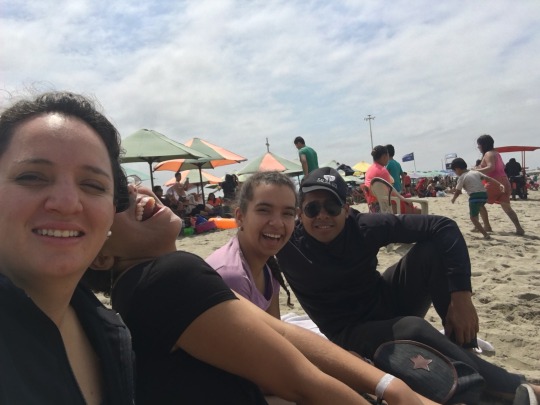
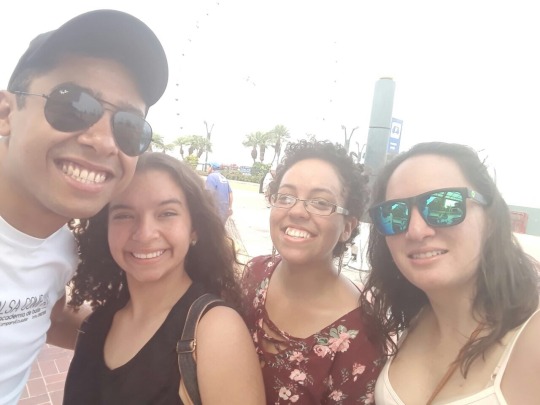
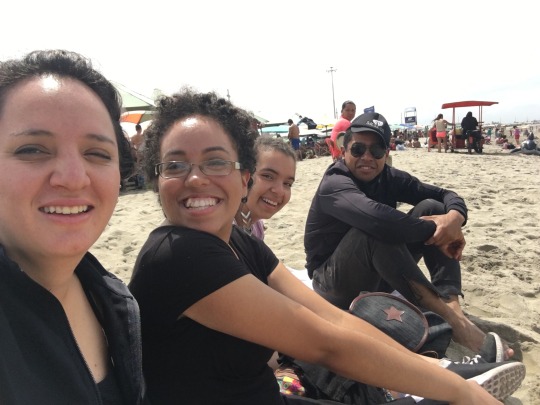
Thinking about the more distant future:
Princeton in Latin America: On one hand the idea of spending a whole other year abroad seems a little crazy. However, I am madly in love with Latin America and want to spend more time in the region. The only reason it seems crazy to me is that it would delay my entrance into medical school even more so and that is just absurd. I am currently debating what to do. I don’t have much time left to decide!
Social Entrepreneurship: I think there is a great big opportunity for innovation in the area of chronic disease prevention and management and it is a very enticing field. I’ve got ideas and each day my experiences help to inform the development of those ideas. Perhaps I won’t walk out of this year with a job per se but a new social enterprise that could impact many lives. It wouldn’t be the first time that I took on a major project from scratch and built it up. It could be really fun and meaningful! Plus, it would allow me to apply the things I am learning in the most tangible way. I have ideas!
Medical School: To be completely honest, there is a small part of me that wonders every day if I should go to medical school. This is hard to admit and I have to ask myself where the feeling comes from since I’ve wanted to be a doctor for about as long as I can remember. I think what it comes down to is the fact that doctors are tied to a system that sometimes requires them to trade passion for medicine and love of humanity for efficiency and endless paperwork. It is quite unfortunate.
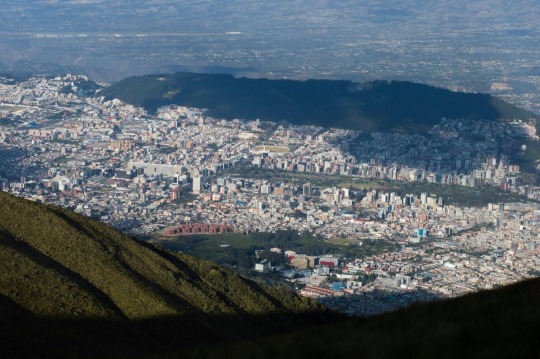
It absolutely pains my heart that I have all but 30 days left in this wonderful country. In that spirit, this post would not be complete without an inspirational tidbit:
“You get a strange feeling when you're about to leave a place, like you'll not only miss the people you love but you'll miss the person you are now at this time and this place, because you'll never be this way again.”
1 note
·
View note
Text
A Little of a Lot a Bit Later Than Usual
Hello there and happy September :)
This post is overdue in that I have not written in over a week. That said, this is an especially long piece filled with stories from distinct experiences in and out of the hospital. I hope you enjoy!
Note: In many ways, a lot of my writing for this week is observational rather than reflectional. I give my input in some places but for the sake of not writing a novel, I am leaving the interpretation part up to you. Anecdotes are hardly ever representative but they offer us the opportunity to think critically about the circumstances that led to a particular event and its outcome. In that way, we can learn loads from anecdotes and I hope that you take the time to consider some of the implications of the stories I am sharing with you.

I look crazy in this picture but it is an insider look at one of my rotations in the hospital (I don’t usually take pictures in the hospital because it feels so unnatural. Convincing myself to ask the doctor for this picture took a while). I learned all about nuclear medicine and in this particular instance, was posing in front of a treadmill that is used as a “stress test” prior to taking “pictures” of the heart.
Complications of Cancer Treatment in Ecuador
**During a radiation oncology rotation, the doctor explained to me that in all of Ecuador, there are only 4 cities that have radiation oncology units. For those of you who are unfamiliar with this topic, radiation therapy is a treatment that is administered every weekday for a set amount of time (usually 5 to 8 weeks). The side effects vary depending on what part of your body receives the treatment. It is very important to note that this is an outpatient treatment, which means that the patient has to go to the hospital everyday but is not hospitalized. What does this mean? If you live outside of the 4 cities and radiation is part of your treatment, you have to travel everyday or find a place to live in one of the cities with the appropriate technology for the duration of your treatment. What happens if neither of these are options - you don’t receive the potentially life-saving treatment.
I heard two stories (of opposite extremes) related to this reality in Ecuador.
- A female patient in her mid-thirties was diagnosed with cervical cancer. She had two children and her husband left her shortly after the news of her diagnosis. Unfortunately, this patient lived 6 hours (via bus) from the closest radiation facility. She decided that it was more affordable to make the 12 hour trip to and from the hospital every day for the entire duration of her treatment (as opposed to finding temporary housing in the city). Since she did not have any familial support, she had no choice but to leave the kids home. It was a tragic situation for all involved parties.
- An elderly male patient (83 y.o) was diagnosed with cancer and had to receive radiation therapy. However, he could not travel alone and none of his children were able to take him to the hospital daily for reasons that were not explained. As a result, this patient simply did not get treatment. After the disease progressed, the family reached out to the hospital again to try and restart the radiation. While this may sound like good news, a more advanced cancer is a lot harder to treat and therefore, the prognosis is not as good as it was the first time radiation was presented as a possibility.
There were also stories between the extremes:
- Many patients stop going to radiation because it makes them feel worse than they had before they started or traveling to the hospital each day becomes too burdensome.
- Hospital runs out of medications that are used in conjunction to radiation therapy (for prostate cancer in particular) so unless the patient can buy them elsewhere, they have no choice but to remain unmedicated until the medicine becomes available at the hospital.
Why do these stories matter? Getting the news that you have cancer is a devastating thing in and of itself. We have tools to combat the disease but unfortunately, their lack of availability leaves already vulnerable people with impossible decisions.
“Foro De Vacunas 2017″

I had the pleasure of attending a conference that was focused on pediatric vaccination strategies in Latin America, the progress of vaccination programs, challenges of implementation, and the continued importance of building a culture that prioritizes preventative medicine, and in this particular case, vaccinations. There was a lot of information that was passed on but here are a few things/ideas/points that stood out to me:
- There were representatives from the Ministry of Public Health present and when they spoke, it was very clear that the audience of medical professionals was skeptical of their performance. I even asked those around me why they were scolding and they told me that the presenters were lying and omitting important information. Specifically, those around me pointed out that a strategy is one thing and that the reality of implementation is another. The Ministry defended themselves saying that they are in a process of revitalization and that progress takes time. A doctor pointed out that it is non-sensical that the ministry develops, implements, and evaluates all of their programs internally. According to him, there should be an independent civilian and professional entity that assesses the progress of the ministry.
- One doctor on a panel said “En vacuna no se gasta. Se invierte” (With vaccines, we do not spend, we invest). In my opinion, this doctor’s words reflect a particular way of thinking about how money is used to achieve public health goals - spend more now to save later. It is a preventative, long term, and forward-looking framework. This was in direct contrast to something another doctor explained: He argued that politicians are not always willing to approve vaccination programs (as well as other long term health projects) because the results are not realized within their political terms and therefore, do not necessarily serve their agendas. In this case, public health expenses and projects are contextualized within short-term and politicized frameworks that prioritize quick results over more fundamental, systematic changes.
- The relationship between climate change, infectious disease, and public health is huge. Among many other things, increasing temperatures have led mosquitos to reproduce in new and larger geographic areas.
- “The lack of access to HPV vaccination, which helps prevent cervical cancer, for young latin american women is simply violence against women. It is unacceptable” - Paraphrased from a presenting doctor.
- This conference had a massive emphasis on the importance of data collection, analysis, and use. Epidemiological data was presented at the forefront. I absolutely agree that evidence-based methodologies are essential for effective public health programs. However, after my medical anthropology class last semester, I recognize that this science-centered rationalization of medicine is just one of many ways of understanding healthcare. The scientific evidence very clearly shows that vaccinations are a safe and effective means for reducing infectious disease and as a person who believes in the biomedical model of medicine, I am convinced that we need to continue improving national vaccination programs. However, for some people in the general public, depersonalized numbers have little meaning. They do not necessarily convince one to prioritize getting vaccinated. That said, I found the conference to be lacking in the discussion of cultural and educational factors that contribute to the challenges of vaccination program implementation. Just last week a doctor was explaining to me that people refused to go to the hospital in a town she worked in because it was a common belief that ‘the hospital kills.” In this community, a successful program would require a nuanced approach that takes into account the fear of biomedical institutions that has been passed down for many generations. As with most large scale programs, standards are important but uniformity is dangerous.
- “Vaccines and vaccination are not the same thing. It is easy to buy vaccines and tons of money is already being invested in this endeavor. However, vaccinating an entire population is very difficult because it requires the consideration of many moving parts that are not always within the control of those tasked with implementing vaccination strategies.” - Paraphrased from a presenting doctor.
Understanding Health Outcomes: Why Do Patients Stop Taking Prescribed Medications?
Here are some of the most common responses patients have given with regards to this question:
- Medication runs out (at home / at hospital / in town)
- Symptoms stop being burdensome so patient assumes medication is no longer necessary
- Side effects are too burdensome
- Patient never obtains medications (misunderstandings / financial restrictions)
- Patients take medication, but not as instructed
- Use of alternative medical remedies instead of prescribed medications
- Don’t understand the purpose or importance of taking a particular medication.
Chronic Disease Management: A topic of increasing interest
Marginalization, access, and healthcare are exceptionally broad topics. In creating a plan for my Watson year, I embraced this broadness as an opportunity to follow my interests and figure out where I fit in in the efforts to improve healthcare access for all. The more time I spend in Ecuador, the more I find myself perplexed and intrigued by the challenges of chronic disease management. Why? This is an issue for the institution of medicine that, based on my observations, is better equipped for the treatment of acute problems. At the same time, it is an issue for those affected because disease management often requires changes in one’s lifestyle that are often very difficult to make. That said, it seems like a topic area where innovation and leadership are very necessary (aka my middle names).
Palliative Care:
I had the wonderful opportunity of spending some time at a foundation in Quito that focuses almost exclusively on providing palliative care services to terminally ill patients. Unlike the rest of medicine, palliative care is not intended to prolong life but rather, to improve the quality of it through medical, spiritual, and emotional support. Palliative care normalizes death and gives patients the opportunity to pass in a painless and dignified manner. To be honest, before I arrived I was afraid of the feelings that might strike me. In the end, I found that it is a deeply human specialty area. There are simply no other words to describe it.
Rural(ish) Healthcare:
Exciting news! Thanks to a partnership with Manna Project International, I will have the opportunity to speak to community members (formally and informally) to learn more about their perspectives on the healthcare services available to them. This is a particularly exciting opportunity because what I learn will not only inform my own explorations but also, possibly contribute to the development of programs at Manna based on what community members say. With a little bit of help at home, I am developing a set of questions that I want to ask to guide some of the conversations I will be having. My first conversation will happen next week. Updates on how it goes are surely to come!
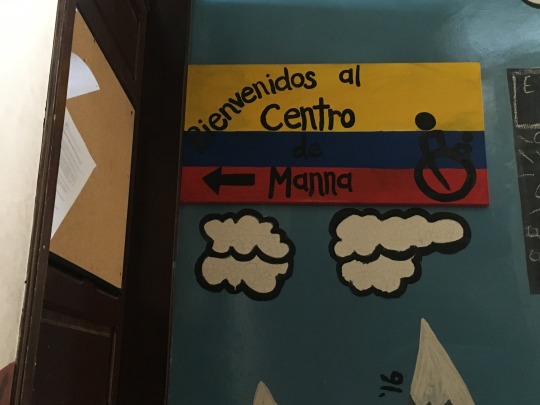
The very cute sign that welcomes all visitors into the hub of Manna Project International.

An impressively bad picture of me on the bus home from my first of hopefully many trips to el Valle de los Chillos.
Updates on My Life as a Dancer:
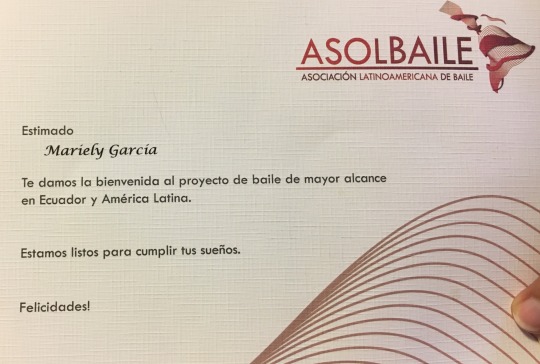
I am kind of obsessed and not really sure what to do or what to make of this. It is a little crazy because for most of my life, I could not imagine a life outside of medicine. However, somehow my love of dance runs so deep that I could picture, for the first time, another thing to which I could dedicate a substantial amount of my time to. This is not to say that I am calling it quits on becoming a doctor or that I even want to. Rather, it serves to show how much of an impact this particular activity has had on my sense of self.
I try to be really reflective about where my feelings come from. Is it simply the sense of community that draws me or is there something else? The more I think about it, the more I realize that music and dance are very tightly knit to my own sense of “latinidad.” How so? I was the child that refused to dance at family parties and had a significantly stronger affinity for all things “english.” I don’t think I really came to consider what being a latina meant to me until I got to college and for the first time, I was not surrounded by a million things “latino.” The first time I felt like an outsider at Bowdoin was not during orientation or in a class but in the dining hall, after spending a weekend away at a conference for dominican students. I realized my “otherness” as a student of color at Bowdoin and rather than feeling ashamed and trying to fit in more, I did the exact opposite. I started to more intentionally explore my “dominicanness” and a huge part of that took the form of music and dance. Therefore, dancing is not simply fun, it is the means through which I understand and explore what it means for me to be a young dominican-american woman. I understand my body to be a political statement and dance allows me to simultaneously engage with and convey the history of my ancestors. To the unknowing passerby, bachata may seem like just another sensual dance. However, as far as I am concerned, the intimacy with which bachata is associated goes beyond the dancing pair. I like to say that bachata is in my blood, and when I dance, I feel intimately connected to my family and our small country in the caribbean. I feel more whole and grounded. Dancing bachata makes me proud to be a Dominican. This is why I love it so much.
It would be naive to ignore the sexism and misogyny that is tightly interwoven into the culture of latino dance and music because there have been many moments, in my time in Ecuador alone, when I have found myself cringing. However, I will leave this topic for another time :) For now we can appreciate the positives.
Life Outside of the Medical Questions
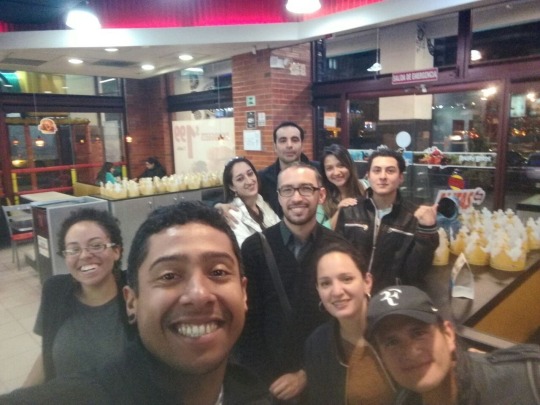
Burger King in Ecuador <3
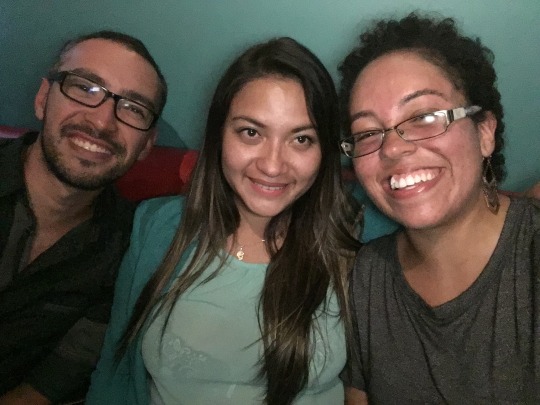
I went to the disco with my dance group and it was loads of fun. When we got to the place, they refused to let me in because a NY driver’s permit is not considered valid identification. I was ready to go home after it was obvious that the guy wasn’t going to change his mind but then Yesi (the girl next to me) offered to go out of her way and drive me to and from home to pick up my passport. When I finally got inside, I was so happy because there were some amazing dancers everywhere (like doing tricks on the dance floor amazing!)

I finally managed to find decently priced books in spanish that I can read. When I finish this book, it will be the first novel I have ever read from start to finish in spanish! I wonder what I felt when I finished a book by myself for the first time. I am almost certain it was something similar to what I will feel when I get to the end of this novel.
The Challenges of this Nomadic Life
It makes me really sad to know that I have to leave eventually. When I went out with my dance friends, we were talking about going to Guayaquil (another city in Ecuador) for a dance conference of sorts. I was under the impression that the event they were talking about was at the end of September and so I was talking as if I was going to be in attendance. However, someone mentioned that it was in November and without thinking, I announced that I could not go. When the instructor looked at me with furrowed brows, I clarified that I would no longer be in Ecuador. His (exact) response was “Mariely no me haga esto” (Mariely don’t do this to me). There was a general pause and the moment passed quickly but it was so heartbreaking because it was a reminder of how temporary my time is here.
If thinking about leaving is hard, it is even harder to think about having to start the process of making friends and integrating myself into the community all over again. Of course this constant change during the Watson experience is expected and comes with its rewards. However, I am not even leaving yet and it feels like “ahhhhh.”
I digress because sometimes I think too far ahead in the future. Since I know my time is limited, it gives me all the more reason to live, love, and laugh with all of my heart and mind, to be at all times, fully in the present.

Things to Look Forward To:
Conferences: I have managed to find a few medical conferences that are free and that address some of the things I am exploring and interested in. I have realized that FB events is a very useful resource!
And of course, this post would not be complete without a quote for the week:
"Wherever you go becomes a part of you somehow.” - Anita Desai
1 note
·
View note
Text
One Month Already?
First, a massive thank you to those who reached out after my post about getting sick. The waves of love were a reminder that I am not at all alone on these adventures. Here are some of my many wanderings of the last week.
All things Ophthalmology
The doctor that I have been rotating with this week has one message - “No hay que adviniar. Todo tiene un logico” (There are no guessing games. Everything has a logic.) With this in mind, this week has been all about appreciating the why of every medical decision, both in terms of anatomy and physiology as well as in terms of the individual circumstances of presenting patients. I won’t lie...I didn’t think much of the eye when I arrived but I have learned so much more than I would have imagined and grown to appreciate its complexity.
Since this week took on such a “science-heavy” tone (I was literally studying the eye and related diseases before bed and on the bus), I think my focus on the patient was considerably deferred. I did not realize that this was the case until a patient with diagnosed glaucoma started sobbing (in the middle of a consultation) at the prospect of losing her vision. The moment left me paralyzed because it was a harsh reminder that eyes belong to people and people have lives. As a person whose main focus at the moment is the patient, it is easy to say that doctors should treat people not diseases. This was the first time that I realized, in a deeply personal way, that doing so is so much harder than it seems (although not impossible).
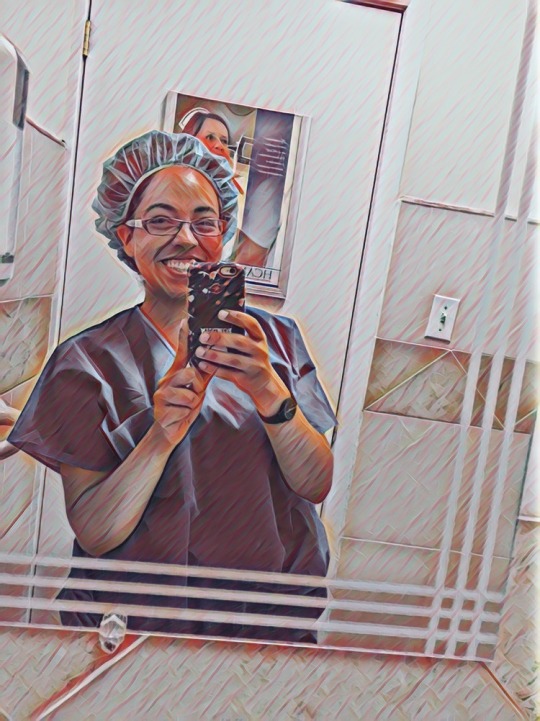
Post eye-surgery bathroom mirror selfie. Note: I will never look at an eyeball the same way again. Despite its seemingly insignificant appearance, it is incredibly complex and delicate and tbh, fascinating in ways that I did not expect.
“If you could change anything about the medical institution, what would you change and why?”
I have asked this question to everyone who has given me the time of day, from patients to doctors to nurses. Here are some of the most common responses:
- Doctors should have less patients so that they could focus more on the needs of individual patients (patient)
- Wait times need to be reduced (various patients)
- Length of work days so that one does not get burnt out so quickly (nurse)
- How patients are treated by hospital personnel (patient)
- Better technology, software, and equipment (various doctors and patients)
- Less bureaucracy, especially when it affects patients (doctor)
- More slots for appointments because I have to take on “extras” when a patient needs to be seen in 48 hours but there are no available appointments for three months (doctor)
- More beds for more patients (medical student)
In a lot of ways, these answers are obvious and applicable to healthcare issues in the United States. Issues of capacity and efficiency are really intriguing because increasing capacity and efficiency is simultaneously a problem and a solution.
There are two obvious ways to increase capacity: more doctors and hospital space or more patients per doctor with increased pressure on the efficiency of consultations. Increasing the medical labor force is expensive and takes time while increasing patient loads reduces the personalization of medicine. This therefore becomes a question of priorities: Is it more important to treat as many patients as possible or to make each consultation as holistic as possible. In an ideal world, both goals would be simultaneously achieved but in real life, there are many circumstances that prevent this from being possible.
This brings me to my next, and perhaps most important question: can we reimagine medicine (completely and totally from the bottom up) so that both things are possible? What does an innovative solution look like? I don’t have an answer but this is the kind of question that keeps me up at night and fuels my explorations. Of course we can work within the system to make meaningful changes but what does work beyond the system look like? Is there a possibility for a total transformation of the system? In my humble opinion, the biggest revolutions happen when people dare to challenge normalized institutions and ways of doing things.
Anyways, enough babbling... this is just food for thought.
My Watson Question
I met a new doctor a few days ago who asked me about what brought me to Ecuador. After I explained my Watson question to him, he asked me what I had learned so far about marginalization and healthcare access in Quito. This was an important moment because it was the first time that someone asked me specifically about the progress I’ve made on my Watson question. As I was gathering my thoughts and explaining my findings, I realized that a lot of the things I was bringing up were things that I was already conscious of (at least partially) before coming to Ecuador. While I now have tidbits of stories, emotions, and observations that I did not have before, my interaction with this doctor helped me realize that my approach to my questions may have to be modified. What do I mean? At the moment, I spend my days in the hospital rotating with different doctors in a variety of departments. I get to observe consultations, procedures, meetings, talk to patients, and everything in between. It has been a very involved experience and a great one to say the least! There is no doubt in my mind that I have learned loads. What is missing? I think the answer is some more exploration into the literature that already exists on the topics I care about (specifically tailored to Ecuador) so that I may be able to observe the same things with a broadened, more in depth understanding of the underlying systems that produce the circumstances I am witness to. Perhaps this should have already been obvious to me and it is silly to bring it up almost a month into my experience. However, in some ways I think it is also advantageous to have gone into the hospital with no pre-dispositions, obtain an on-the-ground perspective, and then fill in the blanks with some research.
With all of this in consideration, I have already begun my dive into the research and am looking to get in contact with public health experts in the city. The major challenge - reading academic papers in spanish...something I have never had to do before. However, this is a compelling challenge because it will allow me to expand my Spanish vocabulary even more.
Touristy Things: Trip to Quilotoa
Everyone has told me that I must visit this place before I leave Ecuador because it is spectacular. They were absolutely right. Walking into the crater of an active volcano? Check!
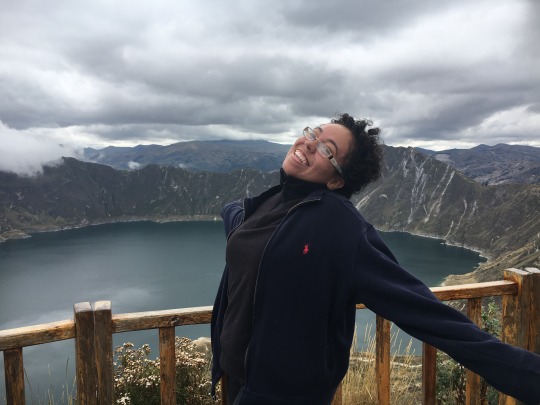
Embracing the beauty of nature with open arms and a big heart. #grateful.
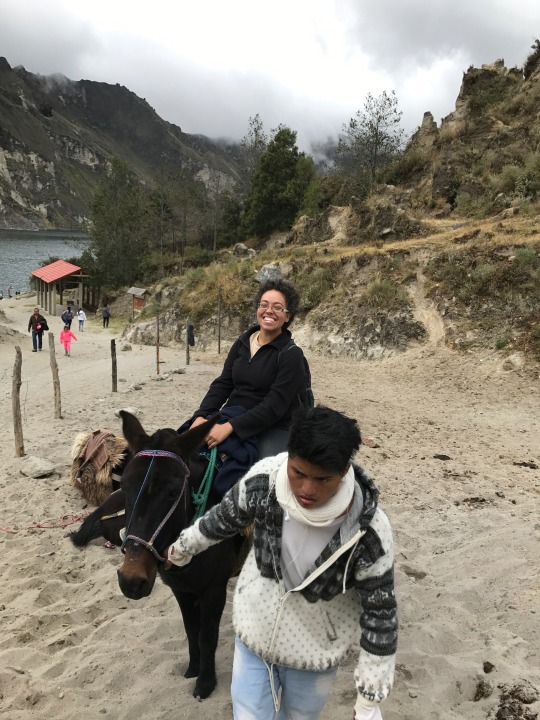
First time riding a mule and I was literally glowing like a small child with inexplicable joy. Unfortunately, my guide doesn’t look too happy...

Pictures don’t do the rolling hills justice. It is a sight I hope everyone has a chance to experience at some point.
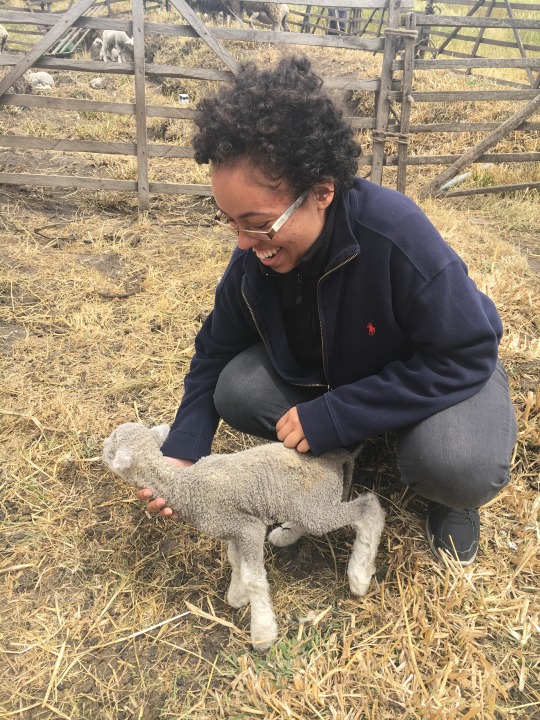
This lil’ thing is only 3 days old!! <3
“Adulting” in a Foreign Country:
Money: I have an extensive expenses spreadsheet that gets updated daily and am pretty intentional about the choices I make when it comes to spending money. However, I have an unreasonably large (and slightly unhealthy) fear of being without money that haunts me day and night. I think that at least part of that fear comes from my upbringing. One of my newer philosophies: experiences last forever, material things do not. Spend accordingly.
Health: I have been eating a lot healthier (I think) then when I left the states in part because it is so much cheaper to buy fresh fruit and veggetables than processed foods (the way it should always be). I cook most of my meals and exercise daily through dance.
Decision-Making: some of you may not agree but I try to remind myself daily that this is my time to be a little selfish, to indulge in the things that most excite me and extract as much knowledge and wisdom from the experiences that come from that indulgence.
Identity Exploration: Joined an LGBT group in the city. Everyone is super nice and it is loads of fun :)
Work-Play Balance: As I have mentioned in previous posts, I am the kind of person that always feels like I am not doing enough (sometimes to my disadvantage). That said, while I am also always looking for ways to fill my time with meaningful activities, I am also embracing my tourist status and creating time to get to know different parts of the city and country.
Safety: This is an unusual sub-category but traveling alone as a woman warrants that this be a big consideration in all of my “adulting.” I am generally very aware of my surroundings and super careful about who I choose to trust. One thing that my heightened awareness for my personal safety has taught me is that living in fear is one of the worst things ever. I feel deeply for those who fear for their safety daily. Fearing that someone will snatch your cell phone is one thing but fearing for your life every day, that is a heartbreaking tragedy.
Moving Forward:
Guatemala: The details are all set. I’ve got a partner organization, a cute apartment, and a lot to look forward to learning. Sadly, I will not be able to dance while I am here but perhaps I can find something similarly rewarding to fill my evenings with.
Argentina: Originally, I was planning on going to Cambodia but I have since changed my itinerary because I wanted to spend a little more time in Latin America, a region I care deeply about. If I am honest, there is a part of me that thinks I am taking an easier road by staying in Latin America. At the same time however, the opportunities that are available to me in Argentina, both because of the abundance of organizations/connections as well as my knowledge of the language, will allow me to learn so, so much more. This feels like the right decision and one that I am very excited about.
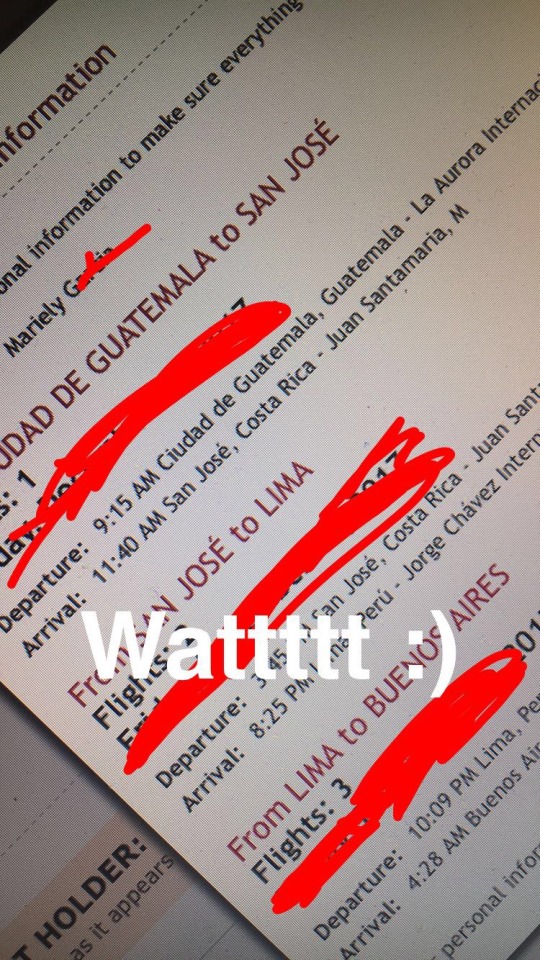
Flight has been booked and apartment reserved. TBH, I can’t wait for Argentina!
--
And finally, throwback to my last few days in the states, when purchasing a lab coat felt like the biggest accomplishment ever. Now, about a month into my Watson, I can look back at the moment when this picture was taken and appreciate that the universe has blessed me a million times over. Little did I know then the many joys that awaited me.

Quote for the week:
“One’s destination is never a place, but a new way of seeing things” - Henry Miller
0 notes
Text
The Human Body: Science and Art
I am a master at writing unnecessarily long posts about seemingly disconnected things but I do hope you enjoy my musings on this week in Ecuador.
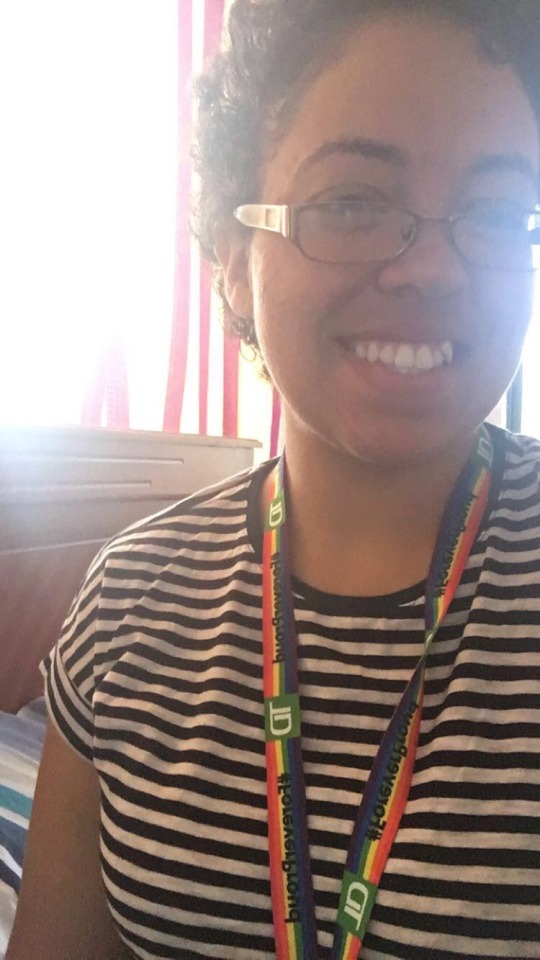
Patient Mariely Garcia
On Monday I got more sick than I have been in a long time and tbh, it was a bit of a nightmare. Long story short, I woke up feeling nauseous but didn’t give it much thought. Things went splendid at work during an internal medicine rotation. Fast forward to my trip home: I was on the bus and I quickly and progressively got more dizzy and nauseous. I begged God (out loud) to just let me make it home but unfortunately, my insides were soon on the outside, my body violently shaking, and those around me panicking for the bus to pull over. I was escorted to the street where I promptly sat on the floor and tried to pull myself together. I couldn’t move my fingers, something that has never happened and something that immediately sent my mind to the worst case scenario. Refusing to call for an ambulance, some good Samaritans helped me call Dr. Torres (the doctor who I work with). May the universe bless him a million times over because he came immediately and stayed with me until I was well enough to go home. Fast forward some more, to a later super market trip, where I passed out just before paying at the register, and then fast forward even more to the morning after I had spent the night crying in pain, and then to Wednesday, when at last it had all passed.
A few thoughts: being sick SUCKS. It is almost awe-inspiring how quickly ones health can disintegrate and how vulnerable one can become. I was in a scary place when I couldn’t move my fingers, in a lonely place when I made it home, and in a painful place as I waited to heal. It was bearable simply because I knew I had support. I hope that I always remember how much better I felt when Dr. Torres came to my side, when my host bought me tea, and when the supemaxi staff cared for me on the supermarket floor. They did not heal me in the literal sense, as I remained sick, but through their smiles and comforting words, they reminded me that I was not alone during what was probably my most vulnerable moment in Ecuador so far. Why does it matter? Meeting sick people as a medical professional is about so much more than just the biological science and medicine. It’s about making it clear that you care and are there to support the individual.
In case you are curious: the culprit of this sudden bout of illness? While it is not 100% official, I am almost CERTAIN, that it was a bad mandarin I ate.
Finding the Connection Between Medicine and Dance
Since arriving in Ecuador, medicine and dance have been at the center of my explorations and while they seem distinctly unrelated, they share one very important thing: a profound appreciation for the physical human body. At the hospital this week, I was lucky enough to watch several endoscopies and colonoscopies. These two procedures allow you to get an HD look inside the body in a minimally invasive way. Putting words to the awe that the images inspired is difficult. I find it so easy to forget how complex our body is until it stops working (i.e. my being sick) or I get to observe it from a completely new perspective (i.e. live video of the colon!). I was also lucky enough to attend the Ecuador Salsa Congress with the company I am dancing with. In competition, special value is placed on the grace and precision with which dancers take over the stage. In this setting, the awe was not for the internal processes that make each movement possible, but rather, for the external poise of the body. Having the time to consider the physical body from these two perspectives has been a special joy that I did not necessarily anticipate. I hope the awe never gets old.
FYI, I have decided that I will be a doctor by day and a dancer by night in the future. This is the kind of thing that people who go to liberal arts schools do :)
Random Things:
Every day is still very much so filled with a sense of newness that I hope does not fade anytime soon. I have taken new routes, visited new places, tried new foods, learned new words, and met new people.
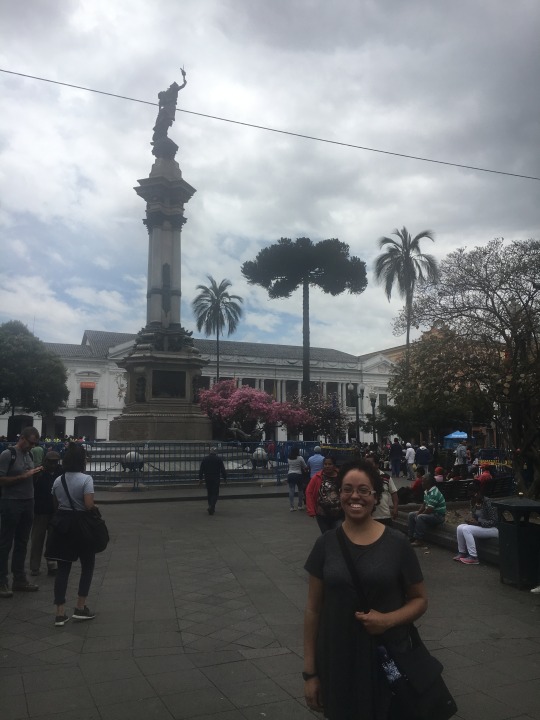
Learning about the history of Ecuador. Fun fact: people have very strong opinions about the relatively recently implemented dollar system (on both sides). Bringing it up is sure to start a heated conversation.

Tried Shrimp ceviche and it is delicious. Despite appearances, it is a cold dish, which caught me off guard.

I started working at Hogar and after getting SUPER lost and arriving to the training rather late, I made a new friend and fell in love with the place. I will only be there once a week which is a bit disappointing because I am trying to fill some free hours but I am excited nonetheless. The place seems like a safe haven and the kids barely know us but were already so loving and welcoming. I suck at taking pictures (hence a logo rather than a picture taken by me) but I am working on that.

Free time is hard for me sometimes because I feel like I am not doing enough and I hate that feeling. As previously mentioned, I am working to fill some free hours but I am also trying to find the value in the freedom. I have been writing a lot more and teaching myself how to cook. I really want to learn ASL and perhaps some coding languages. I have the time and motivation but I have to find the right resources and am open to suggestions.
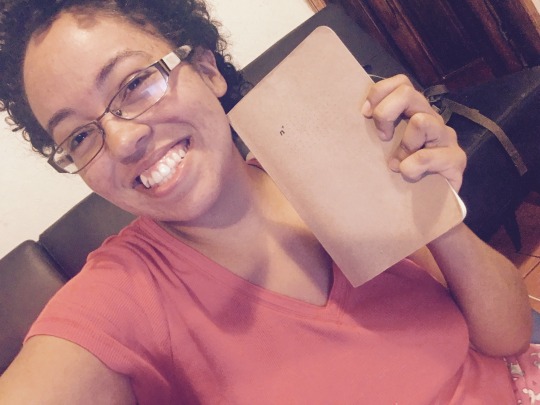
Moving Forward:
Getting to Know More of Ecuador: I am going to embrace my inner tourist and visit the Laguna Quilotoa next weekend which is supposed to be incredibly beautiful. They have kayaking (i.e. one of my favorite things) and I am really looking forward to it.
Digging Deeper Into My Watson Question: There is a natural healing place close to where I live and I really want to interview the owners to learn more about the relationship between biomedicine and other medical traditions in Ecuador. I have to get over my own hesitations and go request the interview. I have found that the moments I have learned the most have been in conversations with people about their stories and so I need to put a stronger emphasis on this in my day-to-day. Part of me wants to do a little project that aims at collecting more stories. Again, I just have to get over my own hesitations and just do it. Since I am a big believer in accountability partners, I am sharing this with you and by the time I post next week, I will have taken steps on the above-mentioned “projects.” In other words, you will be my accountability partner :)
My Next Project Country: I officially got a place in Guatemala which is exciting and I am working on figuring out what my days will look like. It will be a big change of pace going from a city to a small town but I am hopeful it will be okay. Things I am nervous about: feeling trapped or like there isn’t enough for me to do. Things I am excited about: having a large body of water near by, learning about the challenges of indigenous people seeking healthcare, and being less anonymous, which feels inevitable in a big city like Quito.
Quote I Stumbled Upon This Week and Which Is Oddly Fitting: “The value of experience is not in seeing much but in seeing wisely.” - Sir William Osler
0 notes
Text
“I want to be a doctor because I want to figure out what is wrong with me.” - 14 year old patient
I decided to title this piece with a quote from a young patient because I think it really sums up some of the themes of the week. I spent my days rotating through hematology, oncology, and cardiology, which, in my humble opinion, are particularly tough places, as many of the patients are very sick. This week has allowed me to reflect on the less glamorous parts of medicine, including its many limits. Things that came up included pain, death, fear, loneliness, and guilt. I have elaborated on some of these topics below. If you are more curious about my life outside of the hospital, scroll towards the bottom of the post for other updates :)
Pain:
I’ve always known that doctors are tasked with preforming difficult and painful procedures but for whatever reason, the gravity of this struck me particularly hard during a hematology/oncology rotation.
The doctor I was working with was performing bone marrow aspirations on 4 patients. If you’ve never seen a bone marrow aspiration, you should note that it is a very involved procedure in the sense that the doctor has to dig the needle into the patient to get a biopsy sample. You should also note that it is a painful procedure. Here is a picture so you get a sense:
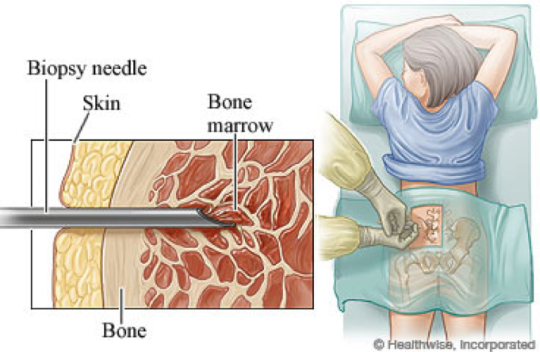
The thing that really struck me about this procedure is the reality of pain in medicine. Doctors have the honor of alleviating suffering but sometimes, doing so requires that they inflict some pain. If I am honest with myself, there is a part of me that thinks I am too soft to ever perform a procedure like this. I found myself wanting to hold the patient’s hand and tell them that they were doing great rather than wishing to be the doctor with the needle. I don’t think this means that I couldn’t or shouldn’t be a doctor but rather, that I am especially sensitive to the patient’s feelings. The doctor I was working with did not go out of his way to console the patient beyond telling them that they should try to breathe through the pain. It is obvious to me that the doctor was very focused on doing the procedure properly and efficiently, as he was behind schedule with a ton of other patients waiting on his attention. This was not necessarily his fault, but simply the result of high patient loads with many time constraints.
So what does this mean? Why does it matter? Well for one, identifying the social factors that affect health outcomes and catering to the human needs of patients requires time that doesn’t necessarily exist during consultations. Therefore, what can be done? On one hand, it would make sense that time constraints should be relaxed by increasing capacity. As the obvious answer, it is also somewhat unrealistic, as it requires a lot of money and human resources. So then what? Perhaps there is a way of modifying the structure of a patient’s visit that would allow for more social evaluation and health education without detracting from the required medical procedures. What does this modified structure look like? Well, TBD.
Death:
I met a 10-year-old patient with a massive and aggressive brain tumor that had spread to various organs in his body. The doctors were going to treat him as best they could but they were very blunt about the fact that his prognosis was very poor and that he was likely going to die. This was my first encounter with death since starting my Watson and it looked like an innocent boy with an eye-patch lying on a bed in front of largely printed cartoon characters. I don’t know how I felt/feel about the whole thing. If nothing else, it is a reminder of the power of the body and the limits of medicine. In describing the case, the doctor mentioned that the family had turned to naturopathy and rejected chemo until recently. I wanted to believe that if they had come sooner, the prognosis would have been better. However, the doctor told me that while the type of cancer he had was responsive to chemo, it almost always comes back, and that therefore, it would not have made much of a difference if they had come sooner.
This leads me to my next question: why do people wait until their conditions are considerably bad before visiting a doctor? In this case, the family decided to try other interventions before going to the hospital. I imagine that that kind of decision is rooted in a variety of factors. I met another patient who waited 8 days before going to the hospital for severe chest pain. When we asked him why he waited, he simply shrugged. I would like to explore this topic a little more, as it could be directly related to barriers to care as well as low “health literacy.”
Trauma:
I met a patient who cried as she explained to me the hassle that she had to go through to get admitted after traveling 6 hours from a more rural part of the country. Her story helped to highlight something that I have definitely seen and even experienced but have never took the time to truly think about: hospitals and other medical facilities are designed to alleviate trauma but they can also be places where trauma, physical, mental, or otherwise, is inflicted. Why am I bringing this up? This can absolutely be a reason why someone might decide to skip a doctor’s appointment or dismiss a health concern. As physical spaces, hospitals are hardly welcoming. How can we make hospitals less traumatic places? Should that even be something we are dedicating time and resources to? Why or why not? I definitely don’t have the answers but I think it is a question worth considering. If you’ve never seen Patch Adams, I definitely recommend you watch it.
Other Random Thoughts From Hospital:
- Anatomy in English is hard. Anatomy in Spanish? VERY hard.
- I have to remind myself that it is okay that I don’t know all the answers to the questions the doctors ask me because I am not a medical student just yet. It’s hard though, because sometimes I can’t help but feel like I am not smart enough.
- I really want to walk up to patients in waiting areas and talk to them. I don’t know how ethical this is or how open they would actually be...
Life Outside of the Hospital
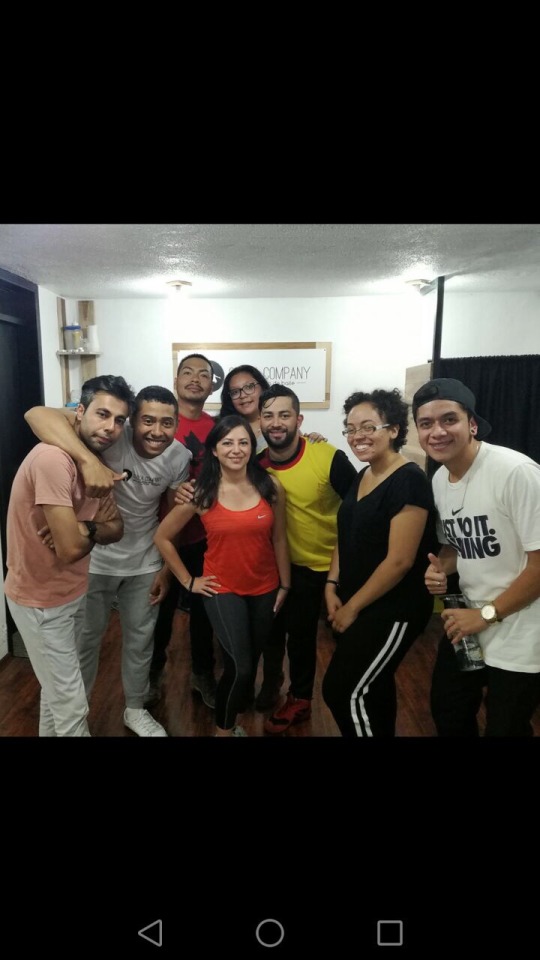


Disconnecting to Connect
I don’t use my phone outside of my apartment unless it is absolutely necessary. There is a kind of liberation in this kind of disconnection. It forces you to take a look around you, to consider what is in front of you, and to appreciate more deeply the day-to-day flow of Quito.
Taking time to be a tourist:
I visited the teleferico, a cable car that takes you to the top of Pichincha, a volcano that borders the city. Saying that it was beautiful is an understatement. Experiences like this put into perspective the grandness of nature and the smallness of humans. It is almost unsettling. I have also taken time to wander the city, which has been fun :) It comforts me to know that there is always something going on.
Dancing:
I have no new comments except that I lovvveeee it <3
Moving Forward:
My life is about to get a lot busier because I will be working in three different facilities during the week, in addition to dancing. Maybe this is a bad idea but I am a doer and I want to take advantage of as many opportunities and meet as many people as possible. I am also starting to think about Guatemala. I have to start reaching out to people and figuring out some of the logistics of what I will be doing.
I’ll leave you with a quote that struck me this week: “It feels good to be lost in the right direction.”
0 notes
Text
Friday Already?
Somehow it got to be Friday and after my first (work) week in Ecuador, I am sitting on my terrace, surrounded by mountains, drinking coffee and writing this post. As I reflect back on the week and what I have learned, here are the things that stand out in my mind.

Hospital Life
I spend my days at a hospital that serves mostly middle class Ecuadorians from around the city and country. It is a large and old building that is always bustling. It reminds me of all the reasons why I am a city girl at heart: I love the rush and seeming chaos. I am very lucky to be working with a doctor who is both immensely knowledgeable and kind. When I arrive in the morning, I spend some time with him and then go off on a rotation with whatever person he suggests. So far, I have had a rotation with a mental health social worker, a nurse in charge of diabetes education, and a cohort of nutritionists. It has been so much fun and even though I have only been here a few days, it feels like I have already learned so much. I came with a set of questions and ideas in mind and I have found that the questions have both evolved and proliferated as I learn more about Ecuador’s healthcare system and listen to the stories of patients (more on this below).
It never ceases to blow my mind how at home and at peace I feel in the hospital. There is no doubt in my mind that it is where I belong.
Dance (and More Dance)
I mentioned in my previous post that I am looking to take dance classes in the city because it is something that I absolutely love. I found a great class and am now dancing 4 nights a week. The instructor is a hilarious Venezuelan with 12 years of experience. The only big downside is that it is a bit of a distance from where I am staying. Fun fact: my first big frustration here was getting super lost on my way to the studio because the bus I was supposed to take stopped running for the day. It was dark and I had no idea where I was but I persevered and made it to the class (albeit late). Thank God for Google Maps. I don’t know what I would have done otherwise.
I have bad knees in general and for whatever reason, the pain seems to be aggravated by the salsa and bachata. Hopefully it doesn’t get much worse. I was on the verge of collapse the other day because my knees hurt so much I swore they would give way. As a general thing, I am horrified of getting sick or having to go to the hospital. I love being the professional but I hate being the patient, and even more so in a foreign country.
A New Friendship
The owner of the apartment I am staying in is literally the sweetest woman in the world. Her name is Alicia and on the first floor of my building she runs an empanada restaurant. I went and sat with her for a bit on Wednesday and right away I knew that I could visit her if anything ever comes up. I look forward to spending more time with her, as she is such a motherly and welcoming person with stories a plenty!
My Watson Question
My Watson is about the experiences of marginalized people (broadly defined) accessing healthcare services and in particular, the unspoken factors that affect a patient’s ability to get and stay healthy. One of the first things I learned upon starting at the hospital is that the majority of the patient population served is middle class. When I spoke about marginalization to the doctors, they seemed to suggest that I was in the wrong place, as the patients don’t necessarily ‘fit the bill.’ However, I believe otherwise, as I am defining marginalization to include more than just socioeconomic status. That said, the way I phrase my questions has evolved to take into account this seeming discrepancy. Some of my broader questions include:
- What are the systemic issues of chronic disease management?
- Why don’t people follow medical advice?
- What makes it hard to become and remain healthy?
- How does a doctor manage a patient who is not very attentive to the details of their care (for whatever reason).
While these questions are fairly broad, they get to the very important issue of the bidirectional relationship between healthcare institutions and patients: Achieving health requires work on both sides of the relationship and whatever factors (political, cultural, social, or otherwise) hinder either from doing their job, ultimately affects health outcomes. My conversations with regard to these topics are only now beginning but some things that have already come up:
- The struggle of scheduling appointments and the complexity of the referral system.
- Services, medicines, and life supporting products that are beyond the coverage of insurance (how is this even decided?)
- Modern lifestyle that values speed and efficiency, oftentimes at the cost of other things that in the past may have kept us more healthy as a species.
- Patient support systems, or lack thereof.
- Challenges of the hospital as an institution: not being able to buy certain medicines, lack of funds for new programs/technology, limited coordination between departments, etc.
Of course these questions and answers are only the start of the conversation and inevitably, there will always be more questions than answers. While that can be seen as a deterrent, I see it as an invitation to imagine answers where they don’t exist.
Small Victories
- Spanish :)
- Nailing my route to and from work (after some trial and error).
- Cooking meals that are actually good (with the help of my mother via FaceTime).
- Sleeping (didn’t do a lot of that in college!)
- Writing more (something I enjoy doing but haven’t had the time to do in the past.)
If you made it this far, wow! Thanks for your support! I’ll leave you with my new favorite word: “Ciao!”
0 notes
Text
The First 24(ish) Hours
Disclaimer: I am taking a very “journal-like” approach to this blog so my goal is to share the things that are on my mind without necessarily creating literary masterpieces. I hope you enjoy the many insignificant details, unapologetically raw emotions, and iphone-quality pictures :)
--
I have officially arrived in Ecuador and have made it safely to my home for the next three months. I feel a lot of things, but mostly joy and gratitude. I am in a beautiful place and the adventures are only beginning. You would think that there wouldn’t be a lot to talk about when you are less than 24 hours into your journey. However, my experience has proved otherwise. Here are some bits of my experiences so far. Pictures to come later!
Travels:
My taxi ride to the airport in NYC was interesting. The driver asked me where I was going and what I was doing and when I told him, he became especially enthusiastic because he comes from a family of doctors and had stories for days. His message: Money is so important in medicine that helping patients achieve and maintain health doesn’t matter as much as their ability to pay for services. My thoughts/questions: There is no doubt in my mind that our healthcare system is stratified in such a way that income is directly related to health outcomes. If healthcare is a right, than this is one of the greatest injustices of our time. How do we fix it though - that is the million dollar question. I can’t say I have an answer because I don’t think there is just one. However, I do hope that as I continue to explore my role in healthcare, I can make meaningful change towards this end.
My plane ride was pretty insignificant with the exception of the descent into Quito. The airport is situated between massive mountains and as the plane descended to land, I could not see the runway and was almost certain that we would crash into the increasingly closer rolling hills and mountain tops. It didn’t help that the plane took a sudden and horrifying dip that caused everyone to scream. It was especially wonderful to land after that and even more wonderful to take in the breathtaking views of the mountainous skyline.
Apartment Living:
I LOVE my studio. The physical space we call home is something that I value more than the average human and therefore, walking into an apartment that was both beautiful and cozy made me feel welcome to the city. I struggled with the choice between studio and homestay before arriving and I think it is a decision I will continue to struggle with as I travel between countries. Homestays are amazing because you get to become more than just a resident of a place but also, a member of a family within that place. However, my time in India taught me that families everywhere are complex and navigating those complexities is a challenge that can become particularly draining. The value of a studio is that you have a space you can retreat to at the end of long days and decompress. The challenge however, is loneliness. For now, I will indulge in the excitement of my very first apartment and push myself to seek a family in Quito at large.
Small Victories:
When I enter a space that I am completely unfamiliar with and therefore, very uncomfortable in, I think it is especially important to celebrate the small victories that make me feel accomplished in some way. Here are a few that have happened in just the first 24 hours!
Taking a walk in the neighborhood I am staying in to get a better sense of place
Going to the “Supermaxi” (a big supermarket) and shopping for the supplies that I need
Leaving my apartment and making it back without getting super lost.
Writing this post :)
Unpacking my bags!
Cooking a meal in my cute compact kitchen
Things that made me smile:
In no particular order:
A kid on the plane that was so expressly in love with flying and was not afraid to let everyone know
Landing in Quito, mostly because I was pretty sure we were going to crash into the surrounding mountains
The rainbow that greeted me when I arrived
The beautiful view of Quito from my terrace
Moving Forward:
I start work at the hospital tomorrow so I am really excited but also a bit nervous because I don’t know what to expect. The doctors I have been talking to are literally the nicest people ever and I am so grateful for all of their time and help thus far. My days are only half full so I am currently looking into other opportunities so that I can meet as many people and learn as much as possible. I might just do what we did in India and show up to people’s offices. It’s a lot easier and quicker but definitely a little intimidating. I have always wanted to write a book, so perhaps this is the time to get writing. Maybe I will find some inspiration in this beautiful place.
I love dancing and am looking to join a dance class in the city. It’s a great way to meet people and express myself. More to come on that later :)
Finally, my next challenge (among many others) is figuring out the bus system here. Even though I am a “city girl,” the buses here intimidate me a little. I will have to get over that quickly because I need them to get around. I think more than anything, I am afraid of walking on and really standing out as an idiot/foreigner because I don’t know what I am doing. It’s a pretty silly fear in the grand scheme of things but it is my truth.
A Tid-Bit of Inspiration From Me to You:
Do what scares you most ;)
0 notes
Text
Updates & Reflections 6/20/17
I turned 22 yesterday, I have just over a month left in the states, and I am starting to put together the pieces of the beginning of my upcoming year. Some of my accomplishments, which may not seem that big but are actually *major* in my humble opinion, include (but aren’t limited to),
- Buying travel health insurance
- Securing accommodations
- Networking like a mad woman to get connected to health professionals in Ecuador
- Some basic shopping for things I am planning on taking
- Researching every possible health org within an hour of Quito
- Organizing my life on an insane Watson excel sheet (because sometimes I’m type A).
- and of course, writing this update :)
Overall, I feel like I could always be doing more in terms of logistics but I’m trying to be kind to myself and recognize that I have done a lot. My job now is really just waiting for people to get back to me and hoping that the pieces fall together.
Emotionally, each day is different. One day I am ready to jump on a plane and just go and the next I very intently indulge in the beauty of my current surroundings and family. There is something truly overwhelming about having no idea what to expect moving forward. My life until now has been very planned and school has occupied most of my days. Clearly, that will not be the case any longer and that is a bit intimidating. However, after going to the hospital for an appointment today and being surrounded by the craziness of medicine and patients, I am reminded of all the reasons this trip is surely to be life-changing. Medicine has got my heart and this trip is all about exploring that passion more deeply and thoughtfully.
I am blessed in a million and one ways and grateful to all of the people who have pushed me to be the best version of myself. I took this picture a little over a week ago during a trip to the beach with my sisters. The trip was spontaneous, the hour late, and the sky, absolutely beautiful. Looking out to the horizon, all I could think was that pretty soon, I will be crossing the seas.
Cheers to the weeks ahead.

0 notes
Video
Date: 5/30/17
My sister: “you look like a farmer.”
Me: “I just did that”
0 notes